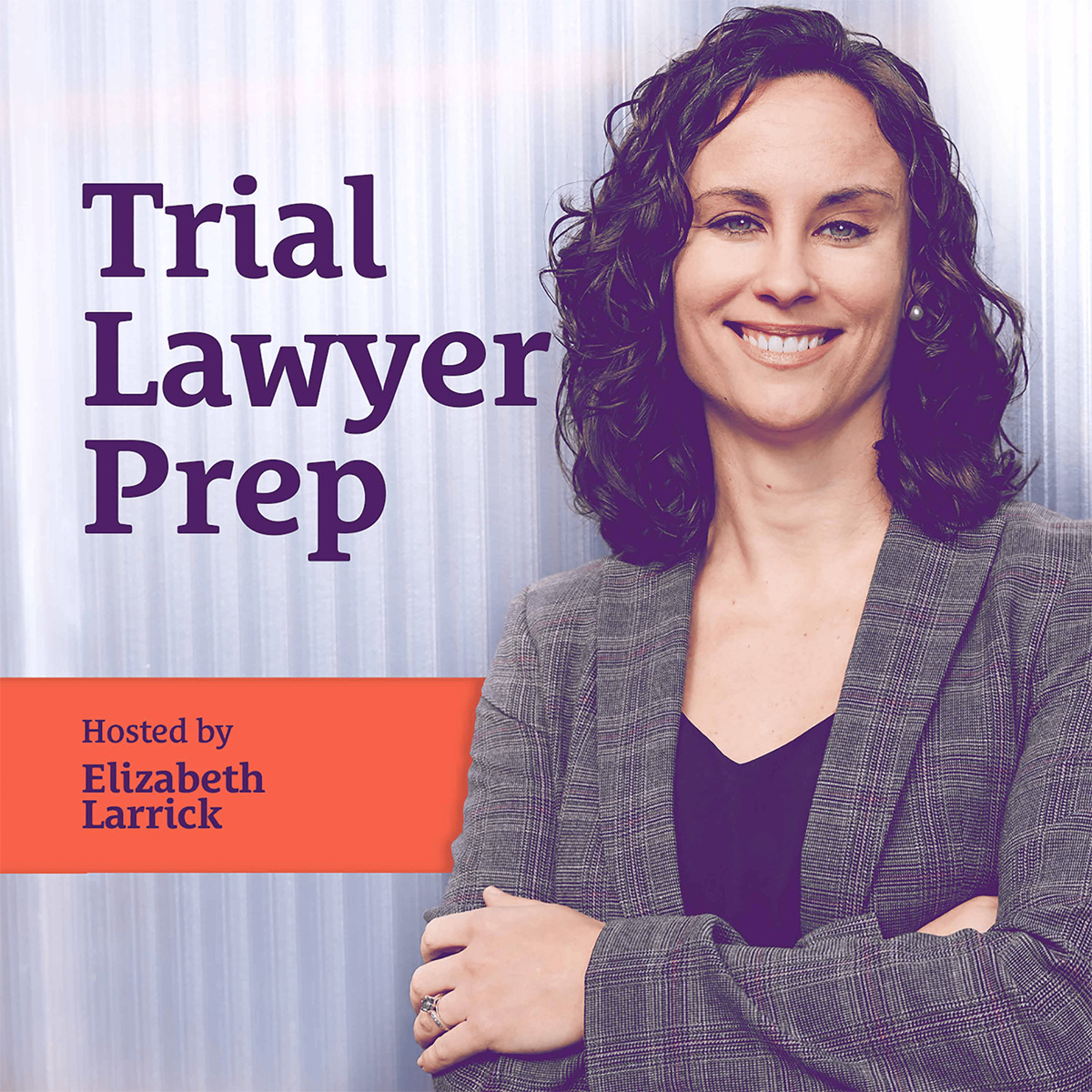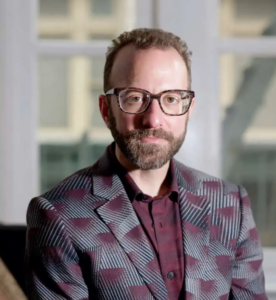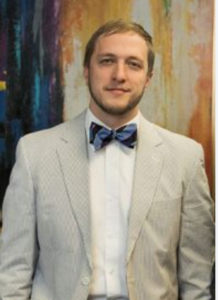When you’ve got 20 years of litigation under your belt, stepping into a new role can feel like a leap. But that’s exactly what Kiele Linroth Pace did when she founded her law firm and took on the fresh challenge of the special counsel role. She has effectively blended her considerable experience in criminal law with the less familiar world of law firm administration. Now, she’s got the freedom to carefully select the projects that inspire her most, and she’s even contemplating the idea of training others to do the same.
Hiring and delegation are two major focal points of our discussion. Kiele shares her expertise in simplifying the hiring process, primarily for law firm owners and solo practitioners. We also talk about the positive impact of having clear job descriptions, accountability, and adequate systems in place for a successful hire. We also tackle some of the common mistakes that can stunt a law firm’s growth – neglecting personal development, overlooking the importance of outside perspective, and underestimating the power of delegation.
One of the most fascinating parts of our conversation revolves around the art of setting boundaries to reclaim time. Kiele shares her journey of learning to set boundaries, and how it has allowed her to conserve energy, enhance productivity, and lead a more balanced life. We also dive into the idea of finding work that truly sparks your passion. Kiele’s perspective is inspiring. Even within the same job, changes can be made to better align your work with your passion.
In this episode, you will hear:
- Special counsel in law firms
- Mistakes impacting law firm growth
- Freelance services and time management for lawyers
- Setting boundaries to reclaim time
- Coaching for ideal clients
Follow and Review:
We’d love for you to follow us if you haven’t yet. Click that purple ‘+’ in the top right corner of your Apple Podcasts app. We’d love it even more if you could drop a review or 5-star rating over on Apple Podcasts. Simply select “Ratings and Reviews” and “Write a Review” then a quick line with your favorite part of the episode. It only takes a second and it helps spread the word about the podcast.
Supporting Resources:
Would you like to learn more about Kiele and her services?
Check out her website: https://pacefirm.com/
Or connect with her on LinkedIn: https://www.linkedin.com/in/kiele/
Books we talked about:
You are a Badass, Jen Sincero: https://www.amazon.com/You-Are-Badass%C2%AE-Doubting-Greatness/dp/0762447699
You are a Badass at Making Money, Jen Sincero: https://www.amazon.com/You-Are-Badass-Making-Money/dp/0735222975
The One Minute Manager, Ken Blanchard PhD and Spencer Johnson, MD: https://www.amazon.com/Minute-Manager-Kenneth-Blanchard-Ph-D/dp/074350917X
The Big Leap, Gay Hendricks: https://www.amazon.com/Big-Leap-Conquer-Hidden-Level/dp/0061735361
Episode Credits:
If you like this podcast and are thinking of creating your own, consider talking to my producer, Emerald City Productions. They helped me grow and produce the podcast you are listening to right now. Find out more at https://emeraldcitypro.com Let them know I sent you.[vc_raw_html css=”.vc_custom_1706917757750{border-radius: 10px !important;}”]JTNDc2NyaXB0JTIwc3JjJTNEJTIyaHR0cHMlM0ElMkYlMkZmLmNvbnZlcnRraXQuY29tJTJGY2tqcyUyRmNrLjUuanMlMjIlM0UlM0MlMkZzY3JpcHQlM0UlMEElMjAlMjAlMjAlMjAlMjAlMjAlM0Nmb3JtJTIwYWN0aW9uJTNEJTIyaHR0cHMlM0ElMkYlMkZhcHAuY29udmVydGtpdC5jb20lMkZmb3JtcyUyRjYwODA2NjUlMkZzdWJzY3JpcHRpb25zJTIyJTIwY2xhc3MlM0QlMjJzZXZhLWZvcm0lMjBmb3Jta2l0LWZvcm0lMjIlMjBtZXRob2QlM0QlMjJwb3N0JTIyJTIwZGF0YS1zdi1mb3JtJTNEJTIyNjA4MDY2NSUyMiUyMGRhdGEtdWlkJTNEJTIyNGU3ZDc4MTRmMSUyMiUyMGRhdGEtZm9ybWF0JTNEJTIyaW5saW5lJTIyJTIwZGF0YS12ZXJzaW9uJTNEJTIyNSUyMiUyMGRhdGEtb3B0aW9ucyUzRCUyMiU3QiUyNnF1b3QlM0JzZXR0aW5ncyUyNnF1b3QlM0IlM0ElN0IlMjZxdW90JTNCYWZ0ZXJfc3Vic2NyaWJlJTI2cXVvdCUzQiUzQSU3QiUyNnF1b3QlM0JhY3Rpb24lMjZxdW90JTNCJTNBJTI2cXVvdCUzQm1lc3NhZ2UlMjZxdW90JTNCJTJDJTI2cXVvdCUzQnN1Y2Nlc3NfbWVzc2FnZSUyNnF1b3QlM0IlM0ElMjZxdW90JTNCU3VjY2VzcyUyMSUyME5vdyUyMGNoZWNrJTIweW91ciUyMGVtYWlsJTIwdG8lMjBjb25maXJtJTIweW91ciUyMHN1YnNjcmlwdGlvbi4lMjZxdW90JTNCJTJDJTI2cXVvdCUzQnJlZGlyZWN0X3VybCUyNnF1b3QlM0IlM0ElMjZxdW90JTNCJTI2cXVvdCUzQiU3RCUyQyUyNnF1b3QlM0JhbmFseXRpY3MlMjZxdW90JTNCJTNBJTdCJTI2cXVvdCUzQmdvb2dsZSUyNnF1b3QlM0IlM0FudWxsJTJDJTI2cXVvdCUzQmZhdGhvbSUyNnF1b3QlM0IlM0FudWxsJTJDJTI2cXVvdCUzQmZhY2Vib29rJTI2cXVvdCUzQiUzQW51bGwlMkMlMjZxdW90JTNCc2VnbWVudCUyNnF1b3QlM0IlM0FudWxsJTJDJTI2cXVvdCUzQnBpbnRlcmVzdCUyNnF1b3QlM0IlM0FudWxsJTJDJTI2cXVvdCUzQnNwYXJrbG9vcCUyNnF1b3QlM0IlM0FudWxsJTJDJTI2cXVvdCUzQmdvb2dsZXRhZ21hbmFnZXIlMjZxdW90JTNCJTNBbnVsbCU3RCUyQyUyNnF1b3QlM0Jtb2RhbCUyNnF1b3QlM0IlM0ElN0IlMjZxdW90JTNCdHJpZ2dlciUyNnF1b3QlM0IlM0ElMjZxdW90JTNCdGltZXIlMjZxdW90JTNCJTJDJTI2cXVvdCUzQnNjcm9sbF9wZXJjZW50YWdlJTI2cXVvdCUzQiUzQW51bGwlMkMlMjZxdW90JTNCdGltZXIlMjZxdW90JTNCJTNBNSUyQyUyNnF1b3QlM0JkZXZpY2VzJTI2cXVvdCUzQiUzQSUyNnF1b3QlM0JhbGwlMjZxdW90JTNCJTJDJTI2cXVvdCUzQnNob3dfb25jZV9ldmVyeSUyNnF1b3QlM0IlM0ExNSU3RCUyQyUyNnF1b3QlM0Jwb3dlcmVkX2J5JTI2cXVvdCUzQiUzQSU3QiUyNnF1b3QlM0JzaG93JTI2cXVvdCUzQiUzQXRydWUlMkMlMjZxdW90JTNCdXJsJTI2cXVvdCUzQiUzQSUyNnF1b3QlM0JodHRwcyUzQSUyRiUyRmNvbnZlcnRraXQuY29tJTJGZmVhdHVyZXMlMkZmb3JtcyUzRnV0bV9jYW1wYWlnbiUzRHBvd2VyZWRieSUyNmFtcCUzQnV0bV9jb250ZW50JTNEZm9ybSUyNmFtcCUzQnV0bV9tZWRpdW0lM0RyZWZlcnJhbCUyNmFtcCUzQnV0bV9zb3VyY2UlM0RkeW5hbWljJTI2cXVvdCUzQiU3RCUyQyUyNnF1b3QlM0JyZWNhcHRjaGElMjZxdW90JTNCJTNBJTdCJTI2cXVvdCUzQmVuYWJsZWQlMjZxdW90JTNCJTNBdHJ1ZSU3RCUyQyUyNnF1b3QlM0JyZXR1cm5fdmlzaXRvciUyNnF1b3QlM0IlM0ElN0IlMjZxdW90JTNCYWN0aW9uJTI2cXVvdCUzQiUzQSUyNnF1b3QlM0JzaG93JTI2cXVvdCUzQiUyQyUyNnF1b3QlM0JjdXN0b21fY29udGVudCUyNnF1b3QlM0IlM0ElMjZxdW90JTNCJTI2cXVvdCUzQiU3RCUyQyUyNnF1b3QlM0JzbGlkZV9pbiUyNnF1b3QlM0IlM0ElN0IlMjZxdW90JTNCZGlzcGxheV9pbiUyNnF1b3QlM0IlM0ElMjZxdW90JTNCYm90dG9tX3JpZ2h0JTI2cXVvdCUzQiUyQyUyNnF1b3QlM0J0cmlnZ2VyJTI2cXVvdCUzQiUzQSUyNnF1b3QlM0J0aW1lciUyNnF1b3QlM0IlMkMlMjZxdW90JTNCc2Nyb2xsX3BlcmNlbnRhZ2UlMjZxdW90JTNCJTNBbnVsbCUyQyUyNnF1b3QlM0J0aW1lciUyNnF1b3QlM0IlM0E1JTJDJTI2cXVvdCUzQmRldmljZXMlMjZxdW90JTNCJTNBJTI2cXVvdCUzQmFsbCUyNnF1b3QlM0IlMkMlMjZxdW90JTNCc2hvd19vbmNlX2V2ZXJ5JTI2cXVvdCUzQiUzQTE1JTdEJTJDJTI2cXVvdCUzQnN0aWNreV9iYXIlMjZxdW90JTNCJTNBJTdCJTI2cXVvdCUzQmRpc3BsYXlfaW4lMjZxdW90JTNCJTNBJTI2cXVvdCUzQnRvcCUyNnF1b3QlM0IlMkMlMjZxdW90JTNCdHJpZ2dlciUyNnF1b3QlM0IlM0ElMjZxdW90JTNCdGltZXIlMjZxdW90JTNCJTJDJTI2cXVvdCUzQnNjcm9sbF9wZXJjZW50YWdlJTI2cXVvdCUzQiUzQW51bGwlMkMlMjZxdW90JTNCdGltZXIlMjZxdW90JTNCJTNBNSUyQyUyNnF1b3QlM0JkZXZpY2VzJTI2cXVvdCUzQiUzQSUyNnF1b3QlM0JhbGwlMjZxdW90JTNCJTJDJTI2cXVvdCUzQnNob3dfb25jZV9ldmVyeSUyNnF1b3QlM0IlM0ExNSU3RCU3RCUyQyUyNnF1b3QlM0J2ZXJzaW9uJTI2cXVvdCUzQiUzQSUyNnF1b3QlM0I1JTI2cXVvdCUzQiU3RCUyMiUyMG1pbi13aWR0aCUzRCUyMjQwMCUyMDUwMCUyMDYwMCUyMDcwMCUyMDgwMCUyMiUyMHN0eWxlJTNEJTIyYmFja2dyb3VuZC1jb2xvciUzQSUyMHJnYiUyODI1NSUyQyUyMDI1NSUyQyUyMDI1NSUyOSUzQiUyMGJvcmRlci1yYWRpdXMlM0ElMjA2cHglM0IlMjIlM0UlM0NkaXYlMjBkYXRhLXN0eWxlJTNEJTIyZnVsbCUyMiUzRSUzQ2RpdiUyMGRhdGEtZWxlbWVudCUzRCUyMmNvbHVtbiUyMiUyMGNsYXNzJTNEJTIyZm9ybWtpdC1jb2x1bW4lMjIlMjBzdHlsZSUzRCUyMmJhY2tncm91bmQtY29sb3IlM0ElMjByZ2IlMjg3NyUyQyUyMDMyJTJDJTIwMTAwJTI5JTNCJTIyJTNFJTNDZGl2JTIwY2xhc3MlM0QlMjJmb3Jta2l0LWJhY2tncm91bmQlMjIlMjBzdHlsZSUzRCUyMm9wYWNpdHklM0ElMjAwLjMlM0IlMjIlM0UlM0MlMkZkaXYlM0UlM0NkaXYlMjBjbGFzcyUzRCUyMmZvcm1raXQtaGVhZGVyJTIyJTIwZGF0YS1lbGVtZW50JTNEJTIyaGVhZGVyJTIyJTIwc3R5bGUlM0QlMjJjb2xvciUzQSUyMHJnYiUyODI0NSUyQyUyMDI1MCUyQyUyMDI1MCUyOSUzQiUyMGZvbnQtc2l6ZSUzQSUyMDIwcHglM0IlMjBmb250LXdlaWdodCUzQSUyMDcwMCUzQiUyMiUzRSUzQ2gyJTNFTGV0JTI3cyUyMGtlZXAlMjB0aGUlMjBjb252ZXJzYXRpb24lMjBnb2luZy4uLiUzQyUyRmgyJTNFJTNDJTJGZGl2JTNFJTNDZGl2JTIwY2xhc3MlM0QlMjJmb3Jta2l0LXN1YmhlYWRlciUyMiUyMGRhdGEtZWxlbWVudCUzRCUyMnN1YmhlYWRlciUyMiUyMHN0eWxlJTNEJTIyY29sb3IlM0ElMjByZ2IlMjgyNDUlMkMlMjAyNTAlMkMlMjAyNTAlMjklM0IlMjBmb250LXNpemUlM0ElMjAxNXB4JTNCJTIyJTNFJTNDcCUzRVN1YnNjcmliZSUyMHRvJTIwZ2V0JTIwdmFsdWFibGUlMjBpbnNpZ2h0cyUyMG9uJTIwY2FzZSUyMHByZXBhcmF0aW9uJTJDJTIwdHJpYWwlMjBzdHJhdGVneSUyQyUyMGZvY3VzJTIwZ3JvdXBzJTJDJTIwd2l0bmVzcyUyMHByZXBhcmF0aW9uJTJDJTIwYW5kJTIwbW9yZSUyMG9mZiUyMHRoZSUyMHNvY2lhbCUyMG1lZGlhJTIwZ3JpZCUyMSUzQyUyRnAlM0UlM0MlMkZkaXYlM0UlM0NkaXYlMjBjbGFzcyUzRCUyMmZvcm1raXQtaW1hZ2UlMjBmb3Jta2l0LWltYWdlJTIwcmVsYXRpdmUlMjBmb2N1cyUzQW91dGxpbmUtbm9uZSUyMiUyMHJvbGUlM0QlMjJidXR0b24lMjIlMjB0YWJpbmRleCUzRCUyMjAlMjIlM0UlM0NpbWclMjBjbGFzcyUzRCUyMmN1cnNvci1wb2ludGVyJTIwZm9jdXMlM0FvdXRsaW5lLWJsdWUlMjAlMjIlMjBzcmMlM0QlMjJodHRwcyUzQSUyRiUyRmVtYmVkLmZpbGVraXRjZG4uY29tJTJGZSUyRnV2cHVXektkc0IzNVA1OXgyanVrQ0wlMkZmWkxoU3liUVB0M2V0TGRlcjJ0anlUJTIyJTIwc3R5bGUlM0QlMjJtYXgtd2lkdGglM0ElMjAxMDAlMjUlM0IlMjIlM0UlM0MlMkZkaXYlM0UlM0MlMkZkaXYlM0UlM0NkaXYlMjBkYXRhLWVsZW1lbnQlM0QlMjJjb2x1bW4lMjIlMjBjbGFzcyUzRCUyMmZvcm1raXQtY29sdW1uJTIyJTNFJTNDdWwlMjBjbGFzcyUzRCUyMmZvcm1raXQtYWxlcnQlMjBmb3Jta2l0LWFsZXJ0LWVycm9yJTIyJTIwZGF0YS1lbGVtZW50JTNEJTIyZXJyb3JzJTIyJTIwZGF0YS1ncm91cCUzRCUyMmFsZXJ0JTIyJTNFJTNDJTJGdWwlM0UlM0NkaXYlMjBkYXRhLWVsZW1lbnQlM0QlMjJmaWVsZHMlMjIlMjBjbGFzcyUzRCUyMnNldmEtZmllbGRzJTIwZm9ybWtpdC1maWVsZHMlMjIlM0UlM0NkaXYlMjBjbGFzcyUzRCUyMmZvcm1raXQtZmllbGQlMjIlM0UlM0NpbnB1dCUyMGNsYXNzJTNEJTIyZm9ybWtpdC1pbnB1dCUyMiUyMG5hbWUlM0QlMjJlbWFpbF9hZGRyZXNzJTIyJTIwYXJpYS1sYWJlbCUzRCUyMkVtYWlsJTIyJTIwcGxhY2Vob2xkZXIlM0QlMjJFbWFpbCUyMiUyMHJlcXVpcmVkJTNEJTIyJTIyJTIwdHlwZSUzRCUyMmVtYWlsJTIyJTIwc3R5bGUlM0QlMjJjb2xvciUzQSUyMHJnYiUyODAlMkMlMjAwJTJDJTIwMCUyOSUzQiUyMGJvcmRlci1jb2xvciUzQSUyMHJnYiUyODIyNyUyQyUyMDIyNyUyQyUyMDIyNyUyOSUzQiUyMGJvcmRlci1yYWRpdXMlM0ElMjA0cHglM0IlMjBmb250LXdlaWdodCUzQSUyMDQwMCUzQiUyMiUzRSUzQyUyRmRpdiUzRSUzQ2RpdiUyMGNsYXNzJTNEJTIyZm9ybWtpdC1maWVsZCUyMiUzRSUzQ2lucHV0JTIwY2xhc3MlM0QlMjJmb3Jta2l0LWlucHV0JTIyJTIwYXJpYS1sYWJlbCUzRCUyMkZpcnN0JTIwTmFtZSUyMiUyMG5hbWUlM0QlMjJmaWVsZHMlNUJmaXJzdF9uYW1lJTVEJTIyJTIwcmVxdWlyZWQlM0QlMjIlMjIlMjBwbGFjZWhvbGRlciUzRCUyMkZpcnN0JTIwTmFtZSUyMiUyMHR5cGUlM0QlMjJ0ZXh0JTIyJTIwc3R5bGUlM0QlMjJjb2xvciUzQSUyMHJnYiUyODAlMkMlMjAwJTJDJTIwMCUyOSUzQiUyMGJvcmRlci1jb2xvciUzQSUyMHJnYiUyODIyNyUyQyUyMDIyNyUyQyUyMDIyNyUyOSUzQiUyMGJvcmRlci1yYWRpdXMlM0ElMjA0cHglM0IlMjBmb250LXdlaWdodCUzQSUyMDQwMCUzQiUyMiUzRSUzQyUyRmRpdiUzRSUzQ2RpdiUyMGNsYXNzJTNEJTIyZm9ybWtpdC1maWVsZCUyMiUzRSUzQ2lucHV0JTIwY2xhc3MlM0QlMjJmb3Jta2l0LWlucHV0JTIyJTIwYXJpYS1sYWJlbCUzRCUyMkxhc3QlMjBuYW1lJTIyJTIwbmFtZSUzRCUyMmZpZWxkcyU1Qmxhc3RfbmFtZSU1RCUyMiUyMHJlcXVpcmVkJTNEJTIyJTIyJTIwcGxhY2Vob2xkZXIlM0QlMjJMYXN0JTIwbmFtZSUyMiUyMHR5cGUlM0QlMjJ0ZXh0JTIyJTIwc3R5bGUlM0QlMjJjb2xvciUzQSUyMHJnYiUyODAlMkMlMjAwJTJDJTIwMCUyOSUzQiUyMGJvcmRlci1jb2xvciUzQSUyMHJnYiUyODIyNyUyQyUyMDIyNyUyQyUyMDIyNyUyOSUzQiUyMGJvcmRlci1yYWRpdXMlM0ElMjA0cHglM0IlMjBmb250LXdlaWdodCUzQSUyMDQwMCUzQiUyMiUzRSUzQyUyRmRpdiUzRSUzQ2RpdiUyMGNsYXNzJTNEJTIyZm9ybWtpdC1maWVsZCUyMiUzRSUzQ2RpdiUyMHJvbGUlM0QlMjJidXR0b24lMjIlMjB0YWJpbmRleCUzRCUyMjAlMjIlM0UlM0NmaWVsZHNldCUyMGRhdGEtZ3JvdXAlM0QlMjJjaGVja2JveGVzJTIyJTIwY2xhc3MlM0QlMjJmb3Jta2l0LTkxOTYlMjIlMjB0eXBlJTNEJTIyQ3VzdG9tJTIyJTIwb3JkZXIlM0QlMjIzJTIyJTIwc2F2ZV9hcyUzRCUyMlRhZyUyMiUyMGdyb3VwJTNEJTIyZmllbGQlMjIlM0UlM0NsZWdlbmQlMjBzdHlsZSUzRCUyMmNvbG9yJTNBJTIwcmdiJTI4MCUyQyUyMDAlMkMlMjAwJTI5JTNCJTIwZm9udC13ZWlnaHQlM0ElMjA0MDAlM0IlMjIlM0VIb3clMjBkaWQlMjB5b3UlMjBoZWFyJTIwYWJvdXQlMjBtZSUzRiUzQyUyRmxlZ2VuZCUzRSUzQ2RpdiUyMGNsYXNzJTNEJTIyZm9ybWtpdC1jaGVja2JveGVzJTIyJTIwZGF0YS1lbGVtZW50JTNEJTIydGFncy1jaGVja2JveGVzJTIyJTIwZGF0YS1ncm91cCUzRCUyMmNoZWNrYm94JTIyJTIwc3R5bGUlM0QlMjJjb2xvciUzQSUyMHJnYiUyODAlMkMlMjAwJTJDJTIwMCUyOSUzQiUyMGJvcmRlci1jb2xvciUzQSUyMHJnYiUyODIyNyUyQyUyMDIyNyUyQyUyMDIyNyUyOSUzQiUyMGJvcmRlci1yYWRpdXMlM0ElMjA0cHglM0IlMjBmb250LXdlaWdodCUzQSUyMDQwMCUzQiUyMiUzRSUzQ2lucHV0JTIwY2xhc3MlM0QlMjJmb3Jta2l0LWNoZWNrYm94JTIyJTIwaWQlM0QlMjJ0YWctODgzNjQ4MzAzLTI3MzkyODElMjIlMjB0eXBlJTNEJTIyY2hlY2tib3glMjIlMjBuYW1lJTNEJTIydGFncyU1QiU1RCUyMiUyMHZhbHVlJTNEJTIyMjczOTI4MSUyMiUzRSUzQ2xhYmVsJTIwZm9yJTNEJTIydGFnLTg4MzY0ODMwMy0yNzM5MjgxJTIyJTNFWW91ciUyMFBvZGNhc3QlM0MlMkZsYWJlbCUzRSUzQyUyRmRpdiUzRSUzQ2RpdiUyMGNsYXNzJTNEJTIyZm9ybWtpdC1jaGVja2JveGVzJTIyJTIwZGF0YS1lbGVtZW50JTNEJTIydGFncy1jaGVja2JveGVzJTIyJTIwZGF0YS1ncm91cCUzRCUyMmNoZWNrYm94JTIyJTIwc3R5bGUlM0QlMjJjb2xvciUzQSUyMHJnYiUyODAlMkMlMjAwJTJDJTIwMCUyOSUzQiUyMGJvcmRlci1jb2xvciUzQSUyMHJnYiUyODIyNyUyQyUyMDIyNyUyQyUyMDIyNyUyOSUzQiUyMGJvcmRlci1yYWRpdXMlM0ElMjA0cHglM0IlMjBmb250LXdlaWdodCUzQSUyMDQwMCUzQiUyMiUzRSUzQ2lucHV0JTIwY2xhc3MlM0QlMjJmb3Jta2l0LWNoZWNrYm94JTIyJTIwaWQlM0QlMjJ0YWctODgzNjQ4MzAzLTQ0MzQzNjIlMjIlMjB0eXBlJTNEJTIyY2hlY2tib3glMjIlMjBuYW1lJTNEJTIydGFncyU1QiU1RCUyMiUyMHZhbHVlJTNEJTIyNDQzNDM2MiUyMiUzRSUzQ2xhYmVsJTIwZm9yJTNEJTIydGFnLTg4MzY0ODMwMy00NDM0MzYyJTIyJTNFTGlua2VkSW4lM0MlMkZsYWJlbCUzRSUzQyUyRmRpdiUzRSUzQ2RpdiUyMGNsYXNzJTNEJTIyZm9ybWtpdC1jaGVja2JveGVzJTIyJTIwZGF0YS1lbGVtZW50JTNEJTIydGFncy1jaGVja2JveGVzJTIyJTIwZGF0YS1ncm91cCUzRCUyMmNoZWNrYm94JTIyJTIwc3R5bGUlM0QlMjJjb2xvciUzQSUyMHJnYiUyODAlMkMlMjAwJTJDJTIwMCUyOSUzQiUyMGJvcmRlci1jb2xvciUzQSUyMHJnYiUyODIyNyUyQyUyMDIyNyUyQyUyMDIyNyUyOSUzQiUyMGJvcmRlci1yYWRpdXMlM0ElMjA0cHglM0IlMjBmb250LXdlaWdodCUzQSUyMDQwMCUzQiUyMiUzRSUzQ2lucHV0JTIwY2xhc3MlM0QlMjJmb3Jta2l0LWNoZWNrYm94JTIyJTIwaWQlM0QlMjJ0YWctODgzNjQ4MzAzLTQ0MzQzNjMlMjIlMjB0eXBlJTNEJTIyY2hlY2tib3glMjIlMjBuYW1lJTNEJTIydGFncyU1QiU1RCUyMiUyMHZhbHVlJTNEJTIyNDQzNDM2MyUyMiUzRSUzQ2xhYmVsJTIwZm9yJTNEJTIydGFnLTg4MzY0ODMwMy00NDM0MzYzJTIyJTNFQSUyMEZyaWVuZCUzQyUyRmxhYmVsJTNFJTNDJTJGZGl2JTNFJTNDZGl2JTIwY2xhc3MlM0QlMjJmb3Jta2l0LWNoZWNrYm94ZXMlMjIlMjBkYXRhLWVsZW1lbnQlM0QlMjJ0YWdzLWNoZWNrYm94ZXMlMjIlMjBkYXRhLWdyb3VwJTNEJTIyY2hlY2tib3glMjIlMjBzdHlsZSUzRCUyMmNvbG9yJTNBJTIwcmdiJTI4MCUyQyUyMDAlMkMlMjAwJTI5JTNCJTIwYm9yZGVyLWNvbG9yJTNBJTIwcmdiJTI4MjI3JTJDJTIwMjI3JTJDJTIwMjI3JTI5JTNCJTIwYm9yZGVyLXJhZGl1cyUzQSUyMDRweCUzQiUyMGZvbnQtd2VpZ2h0JTNBJTIwNDAwJTNCJTIyJTNFJTNDaW5wdXQlMjBjbGFzcyUzRCUyMmZvcm1raXQtY2hlY2tib3glMjIlMjBpZCUzRCUyMnRhZy04ODM2NDgzMDMtNDQzNDM2NSUyMiUyMHR5cGUlM0QlMjJjaGVja2JveCUyMiUyMG5hbWUlM0QlMjJ0YWdzJTVCJTVEJTIyJTIwdmFsdWUlM0QlMjI0NDM0MzY1JTIyJTNFJTNDbGFiZWwlMjBmb3IlM0QlMjJ0YWctODgzNjQ4MzAzLTQ0MzQzNjUlMjIlM0VHb29nbGUlMkYlMjBJbnRlcm5ldCUyMHNlYXJjaCUzQyUyRmxhYmVsJTNFJTNDJTJGZGl2JTNFJTNDZGl2JTIwY2xhc3MlM0QlMjJmb3Jta2l0LWNoZWNrYm94ZXMlMjIlMjBkYXRhLWVsZW1lbnQlM0QlMjJ0YWdzLWNoZWNrYm94ZXMlMjIlMjBkYXRhLWdyb3VwJTNEJTIyY2hlY2tib3glMjIlMjBzdHlsZSUzRCUyMmNvbG9yJTNBJTIwcmdiJTI4MCUyQyUyMDAlMkMlMjAwJTI5JTNCJTIwYm9yZGVyLWNvbG9yJTNBJTIwcmdiJTI4MjI3JTJDJTIwMjI3JTJDJTIwMjI3JTI5JTNCJTIwYm9yZGVyLXJhZGl1cyUzQSUyMDRweCUzQiUyMGZvbnQtd2VpZ2h0JTNBJTIwNDAwJTNCJTIyJTNFJTNDaW5wdXQlMjBjbGFzcyUzRCUyMmZvcm1raXQtY2hlY2tib3glMjIlMjBpZCUzRCUyMnRhZy04ODM2NDgzMDMtNDQzNDM2NyUyMiUyMHR5cGUlM0QlMjJjaGVja2JveCUyMiUyMG5hbWUlM0QlMjJ0YWdzJTVCJTVEJTIyJTIwdmFsdWUlM0QlMjI0NDM0MzY3JTIyJTNFJTNDbGFiZWwlMjBmb3IlM0QlMjJ0YWctODgzNjQ4MzAzLTQ0MzQzNjclMjIlM0VDTEUlMjBFdmVudCUzQyUyRmxhYmVsJTNFJTNDJTJGZGl2JTNFJTNDJTJGZmllbGRzZXQlM0UlM0MlMkZkaXYlM0UlM0MlMkZkaXYlM0UlM0NkaXYlMjBjbGFzcyUzRCUyMmZvcm1raXQtZmllbGQlMjIlM0UlM0NkaXYlMjByb2xlJTNEJTIyYnV0dG9uJTIyJTIwdGFiaW5kZXglM0QlMjIwJTIyJTNFJTNDZmllbGRzZXQlMjBkYXRhLWdyb3VwJTNEJTIyY2hlY2tib3hlcyUyMiUyMGNsYXNzJTNEJTIyZm9ybWtpdC05NTkzJTIyJTIwdHlwZSUzRCUyMkN1c3RvbSUyMiUyMG9yZGVyJTNEJTIyNCUyMiUyMHNhdmVfYXMlM0QlMjJUYWclMjIlMjBncm91cCUzRCUyMmZpZWxkJTIyJTNFJTNDbGVnZW5kJTIwc3R5bGUlM0QlMjJjb2xvciUzQSUyMHJnYiUyODAlMkMlMjAwJTJDJTIwMCUyOSUzQiUyMGZvbnQtd2VpZ2h0JTNBJTIwNDAwJTNCJTIyJTNFSSUyMGFtJTIwYSUyOG4lMjklM0ElM0MlMkZsZWdlbmQlM0UlM0NkaXYlMjBjbGFzcyUzRCUyMmZvcm1raXQtY2hlY2tib3hlcyUyMiUyMGRhdGEtZWxlbWVudCUzRCUyMnRhZ3MtY2hlY2tib3hlcyUyMiUyMGRhdGEtZ3JvdXAlM0QlMjJjaGVja2JveCUyMiUyMHN0eWxlJTNEJTIyY29sb3IlM0ElMjByZ2IlMjgwJTJDJTIwMCUyQyUyMDAlMjklM0IlMjBib3JkZXItY29sb3IlM0ElMjByZ2IlMjgyMjclMkMlMjAyMjclMkMlMjAyMjclMjklM0IlMjBib3JkZXItcmFkaXVzJTNBJTIwNHB4JTNCJTIwZm9udC13ZWlnaHQlM0ElMjA0MDAlM0IlMjIlM0UlM0NpbnB1dCUyMGNsYXNzJTNEJTIyZm9ybWtpdC1jaGVja2JveCUyMiUyMGlkJTNEJTIydGFnLTg4MzY0ODU5My0xNTc5NTAwJTIyJTIwdHlwZSUzRCUyMmNoZWNrYm94JTIyJTIwbmFtZSUzRCUyMnRhZ3MlNUIlNUQlMjIlMjB2YWx1ZSUzRCUyMjE1Nzk1MDAlMjIlM0UlM0NsYWJlbCUyMGZvciUzRCUyMnRhZy04ODM2NDg1OTMtMTU3OTUwMCUyMiUzRUxhd3llciUyMCUyRiUyMEF0dG9ybmV5JTIwJTNDJTJGbGFiZWwlM0UlM0MlMkZkaXYlM0UlM0NkaXYlMjBjbGFzcyUzRCUyMmZvcm1raXQtY2hlY2tib3hlcyUyMiUyMGRhdGEtZWxlbWVudCUzRCUyMnRhZ3MtY2hlY2tib3hlcyUyMiUyMGRhdGEtZ3JvdXAlM0QlMjJjaGVja2JveCUyMiUyMHN0eWxlJTNEJTIyY29sb3IlM0ElMjByZ2IlMjgwJTJDJTIwMCUyQyUyMDAlMjklM0IlMjBib3JkZXItY29sb3IlM0ElMjByZ2IlMjgyMjclMkMlMjAyMjclMkMlMjAyMjclMjklM0IlMjBib3JkZXItcmFkaXVzJTNBJTIwNHB4JTNCJTIwZm9udC13ZWlnaHQlM0ElMjA0MDAlM0IlMjIlM0UlM0NpbnB1dCUyMGNsYXNzJTNEJTIyZm9ybWtpdC1jaGVja2JveCUyMiUyMGlkJTNEJTIydGFnLTg4MzY0ODU5My00NDM0Mzc1JTIyJTIwdHlwZSUzRCUyMmNoZWNrYm94JTIyJTIwbmFtZSUzRCUyMnRhZ3MlNUIlNUQlMjIlMjB2YWx1ZSUzRCUyMjQ0MzQzNzUlMjIlM0UlM0NsYWJlbCUyMGZvciUzRCUyMnRhZy04ODM2NDg1OTMtNDQzNDM3NSUyMiUzRUxlZ2FsJTIwc3VwcG9ydCUyMCUyRiUyMFBhcmFsZWdhbCUyMCUzQyUyRmxhYmVsJTNFJTNDJTJGZGl2JTNFJTNDZGl2JTIwY2xhc3MlM0QlMjJmb3Jta2l0LWNoZWNrYm94ZXMlMjIlMjBkYXRhLWVsZW1lbnQlM0QlMjJ0YWdzLWNoZWNrYm94ZXMlMjIlMjBkYXRhLWdyb3VwJTNEJTIyY2hlY2tib3glMjIlMjBzdHlsZSUzRCUyMmNvbG9yJTNBJTIwcmdiJTI4MCUyQyUyMDAlMkMlMjAwJTI5JTNCJTIwYm9yZGVyLWNvbG9yJTNBJTIwcmdiJTI4MjI3JTJDJTIwMjI3JTJDJTIwMjI3JTI5JTNCJTIwYm9yZGVyLXJhZGl1cyUzQSUyMDRweCUzQiUyMGZvbnQtd2VpZ2h0JTNBJTIwNDAwJTNCJTIyJTNFJTNDaW5wdXQlMjBjbGFzcyUzRCUyMmZvcm1raXQtY2hlY2tib3glMjIlMjBpZCUzRCUyMnRhZy04ODM2NDg1OTMtNDQzNDM3NiUyMiUyMHR5cGUlM0QlMjJjaGVja2JveCUyMiUyMG5hbWUlM0QlMjJ0YWdzJTVCJTVEJTIyJTIwdmFsdWUlM0QlMjI0NDM0Mzc2JTIyJTNFJTNDbGFiZWwlMjBmb3IlM0QlMjJ0YWctODgzNjQ4NTkzLTQ0MzQzNzYlMjIlM0VMZWdhbCUyMENvbnN1bHRhbnQlMjAlMkYlMjBWZW5kb3IlM0MlMkZsYWJlbCUzRSUzQyUyRmRpdiUzRSUzQyUyRmZpZWxkc2V0JTNFJTNDJTJGZGl2JTNFJTNDJTJGZGl2JTNFJTNDZGl2JTIwY2xhc3MlM0QlMjJmb3Jta2l0LWZpZWxkJTIyJTNFJTNDaW5wdXQlMjBjbGFzcyUzRCUyMmZvcm1raXQtaW5wdXQlMjIlMjBhcmlhLWxhYmVsJTNEJTIySm9iJTIwVGl0bGUlMjAlMjhpZiUyMGRpZmZlcmVudCUyMGZyb20lMjBvbmUlMjBvZiUyMHRoZSUyMGFib3ZlJTIwb3B0aW9ucyUyOSUyMiUyMG5hbWUlM0QlMjJmaWVsZHMlNUJzdWJzY3JpYmVyX3R5cGUlNUQlMjIlMjBwbGFjZWhvbGRlciUzRCUyMkpvYiUyMFRpdGxlJTIwJTI4aWYlMjBkaWZmZXJlbnQlMjBmcm9tJTIwb25lJTIwb2YlMjB0aGUlMjBhYm92ZSUyMG9wdGlvbnMlMjklMjIlMjB0eXBlJTNEJTIydGV4dCUyMiUyMHN0eWxlJTNEJTIyY29sb3IlM0ElMjByZ2IlMjgwJTJDJTIwMCUyQyUyMDAlMjklM0IlMjBib3JkZXItY29sb3IlM0ElMjByZ2IlMjgyMjclMkMlMjAyMjclMkMlMjAyMjclMjklM0IlMjBib3JkZXItcmFkaXVzJTNBJTIwNHB4JTNCJTIwZm9udC13ZWlnaHQlM0ElMjA0MDAlM0IlMjIlM0UlM0MlMkZkaXYlM0UlM0NidXR0b24lMjBkYXRhLWVsZW1lbnQlM0QlMjJzdWJtaXQlMjIlMjBjbGFzcyUzRCUyMmZvcm1raXQtc3VibWl0JTIwZm9ybWtpdC1zdWJtaXQlMjIlMjBzdHlsZSUzRCUyMmNvbG9yJTNBJTIwcmdiJTI4MjU1JTJDJTIwMjU1JTJDJTIwMjU1JTI5JTNCJTIwYmFja2dyb3VuZC1jb2xvciUzQSUyMHJnYiUyODI0OCUyQyUyMDk5JTJDJTIwNzQlMjklM0IlMjBib3JkZXItcmFkaXVzJTNBJTIwMjRweCUzQiUyMGZvbnQtd2VpZ2h0JTNBJTIwNzAwJTNCJTIyJTNFJTNDZGl2JTIwY2xhc3MlM0QlMjJmb3Jta2l0LXNwaW5uZXIlMjIlM0UlM0NkaXYlM0UlM0MlMkZkaXYlM0UlM0NkaXYlM0UlM0MlMkZkaXYlM0UlM0NkaXYlM0UlM0MlMkZkaXYlM0UlM0MlMkZkaXYlM0UlM0NzcGFuJTIwY2xhc3MlM0QlMjIlMjIlM0VTdWJzY3JpYmUlM0MlMkZzcGFuJTNFJTNDJTJGYnV0dG9uJTNFJTNDJTJGZGl2JTNFJTNDZGl2JTIwY2xhc3MlM0QlMjJmb3Jta2l0LWd1YXJhbnRlZSUyMiUyMGRhdGEtZWxlbWVudCUzRCUyMmd1YXJhbnRlZSUyMiUyMHN0eWxlJTNEJTIyY29sb3IlM0ElMjByZ2IlMjg3NyUyQyUyMDc3JTJDJTIwNzclMjklM0IlMjBmb250LXNpemUlM0ElMjAxM3B4JTNCJTIwZm9udC13ZWlnaHQlM0ElMjA0MDAlM0IlMjIlM0VXZSUyMHJlc3BlY3QlMjB5b3VyJTIwcHJpdmFjeS4lMjBVbnN1YnNjcmliZSUyMGF0JTIwYW55JTIwdGltZS4lM0MlMkZkaXYlM0UlM0NkaXYlMjBjbGFzcyUzRCUyMmZvcm1raXQtcG93ZXJlZC1ieS1jb252ZXJ0a2l0LWNvbnRhaW5lciUyMiUzRSUzQ2ElMjBocmVmJTNEJTIyaHR0cHMlM0ElMkYlMkZjb252ZXJ0a2l0LmNvbSUyRmZlYXR1cmVzJTJGZm9ybXMlM0Z1dG1fY2FtcGFpZ24lM0Rwb3dlcmVkYnklMjZhbXAlM0J1dG1fY29udGVudCUzRGZvcm0lMjZhbXAlM0J1dG1fbWVkaXVtJTNEcmVmZXJyYWwlMjZhbXAlM0J1dG1fc291cmNlJTNEZHluYW1pYyUyMiUyMGRhdGEtZWxlbWVudCUzRCUyMnBvd2VyZWQtYnklMjIlMjBjbGFzcyUzRCUyMmZvcm1raXQtcG93ZXJlZC1ieS1jb252ZXJ0a2l0JTIyJTIwZGF0YS12YXJpYW50JTNEJTIyZGFyayUyMiUyMHRhcmdldCUzRCUyMl9ibGFuayUyMiUyMHJlbCUzRCUyMm5vZm9sbG93JTIyJTNFQnVpbHQlMjB3aXRoJTIwQ29udmVydEtpdCUzQyUyRmElM0UlM0MlMkZkaXYlM0UlM0MlMkZkaXYlM0UlM0MlMkZkaXYlM0UlM0NzdHlsZSUzRS5mb3Jta2l0LWZvcm0lNUJkYXRhLXVpZCUzRCUyMjRlN2Q3ODE0ZjElMjIlNUQlMjAlMkElN0Jib3gtc2l6aW5nJTNBYm9yZGVyLWJveCUzQiU3RC5mb3Jta2l0LWZvcm0lNUJkYXRhLXVpZCUzRCUyMjRlN2Q3ODE0ZjElMjIlNUQlN0Itd2Via2l0LWZvbnQtc21vb3RoaW5nJTNBYW50aWFsaWFzZWQlM0ItbW96LW9zeC1mb250LXNtb290aGluZyUzQWdyYXlzY2FsZSUzQiU3RC5mb3Jta2l0LWZvcm0lNUJkYXRhLXVpZCUzRCUyMjRlN2Q3ODE0ZjElMjIlNUQlMjBsZWdlbmQlN0Jib3JkZXIlM0Fub25lJTNCZm9udC1zaXplJTNBaW5oZXJpdCUzQm1hcmdpbi1ib3R0b20lM0ExMHB4JTNCcGFkZGluZyUzQTAlM0Jwb3NpdGlvbiUzQXJlbGF0aXZlJTNCZGlzcGxheSUzQXRhYmxlJTNCJTdELmZvcm1raXQtZm9ybSU1QmRhdGEtdWlkJTNEJTIyNGU3ZDc4MTRmMSUyMiU1RCUyMGZpZWxkc2V0JTdCYm9yZGVyJTNBMCUzQnBhZGRpbmclM0EwLjAxZW0lMjAwJTIwMCUyMDAlM0JtYXJnaW4lM0EwJTNCbWluLXdpZHRoJTNBMCUzQiU3RC5mb3Jta2l0LWZvcm0lNUJkYXRhLXVpZCUzRCUyMjRlN2Q3ODE0ZjElMjIlNUQlMjBib2R5JTNBbm90JTI4JTNBLW1vei1oYW5kbGVyLWJsb2NrZWQlMjklMjBmaWVsZHNldCU3QmRpc3BsYXklM0F0YWJsZS1jZWxsJTNCJTdELmZvcm1raXQtZm9ybSU1QmRhdGEtdWlkJTNEJTIyNGU3ZDc4MTRmMSUyMiU1RCUyMGgxJTJDLmZvcm1raXQtZm9ybSU1QmRhdGEtdWlkJTNEJTIyNGU3ZDc4MTRmMSUyMiU1RCUyMGgyJTJDLmZvcm1raXQtZm9ybSU1QmRhdGEtdWlkJTNEJTIyNGU3ZDc4MTRmMSUyMiU1RCUyMGgzJTJDLmZvcm1raXQtZm9ybSU1QmRhdGEtdWlkJTNEJTIyNGU3ZDc4MTRmMSUyMiU1RCUyMGg0JTJDLmZvcm1raXQtZm9ybSU1QmRhdGEtdWlkJTNEJTIyNGU3ZDc4MTRmMSUyMiU1RCUyMGg1JTJDLmZvcm1raXQtZm9ybSU1QmRhdGEtdWlkJTNEJTIyNGU3ZDc4MTRmMSUyMiU1RCUyMGg2JTdCY29sb3IlM0Fpbmhlcml0JTNCZm9udC1zaXplJTNBaW5oZXJpdCUzQmZvbnQtd2VpZ2h0JTNBaW5oZXJpdCUzQiU3RC5mb3Jta2l0LWZvcm0lNUJkYXRhLXVpZCUzRCUyMjRlN2Q3ODE0ZjElMjIlNUQlMjBoMiU3QmZvbnQtc2l6ZSUzQTEuNWVtJTNCbWFyZ2luJTNBMWVtJTIwMCUzQiU3RC5mb3Jta2l0LWZvcm0lNUJkYXRhLXVpZCUzRCUyMjRlN2Q3ODE0ZjElMjIlNUQlMjBoMyU3QmZvbnQtc2l6ZSUzQTEuMTdlbSUzQm1hcmdpbiUzQTFlbSUyMDAlM0IlN0QuZm9ybWtpdC1mb3JtJTVCZGF0YS11aWQlM0QlMjI0ZTdkNzgxNGYxJTIyJTVEJTIwcCU3QmNvbG9yJTNBaW5oZXJpdCUzQmZvbnQtc2l6ZSUzQWluaGVyaXQlM0Jmb250LXdlaWdodCUzQWluaGVyaXQlM0IlN0QuZm9ybWtpdC1mb3JtJTVCZGF0YS11aWQlM0QlMjI0ZTdkNzgxNGYxJTIyJTVEJTIwb2wlM0Fub3QlMjglNUJ0ZW1wbGF0ZS1kZWZhdWx0JTVEJTI5JTJDLmZvcm1raXQtZm9ybSU1QmRhdGEtdWlkJTNEJTIyNGU3ZDc4MTRmMSUyMiU1RCUyMHVsJTNBbm90JTI4JTVCdGVtcGxhdGUtZGVmYXVsdCU1RCUyOSUyQy5mb3Jta2l0LWZvcm0lNUJkYXRhLXVpZCUzRCUyMjRlN2Q3ODE0ZjElMjIlNUQlMjBibG9ja3F1b3RlJTNBbm90JTI4JTVCdGVtcGxhdGUtZGVmYXVsdCU1RCUyOSU3QnRleHQtYWxpZ24lM0FsZWZ0JTNCJTdELmZvcm1raXQtZm9ybSU1QmRhdGEtdWlkJTNEJTIyNGU3ZDc4MTRmMSUyMiU1RCUyMHAlM0Fub3QlMjglNUJ0ZW1wbGF0ZS1kZWZhdWx0JTVEJTI5JTJDLmZvcm1raXQtZm9ybSU1QmRhdGEtdWlkJTNEJTIyNGU3ZDc4MTRmMSUyMiU1RCUyMGhyJTNBbm90JTI4JTVCdGVtcGxhdGUtZGVmYXVsdCU1RCUyOSUyQy5mb3Jta2l0LWZvcm0lNUJkYXRhLXVpZCUzRCUyMjRlN2Q3ODE0ZjElMjIlNUQlMjBibG9ja3F1b3RlJTNBbm90JTI4JTVCdGVtcGxhdGUtZGVmYXVsdCU1RCUyOSUyQy5mb3Jta2l0LWZvcm0lNUJkYXRhLXVpZCUzRCUyMjRlN2Q3ODE0ZjElMjIlNUQlMjBvbCUzQW5vdCUyOCU1QnRlbXBsYXRlLWRlZmF1bHQlNUQlMjklMkMuZm9ybWtpdC1mb3JtJTVCZGF0YS11aWQlM0QlMjI0ZTdkNzgxNGYxJTIyJTVEJTIwdWwlM0Fub3QlMjglNUJ0ZW1wbGF0ZS1kZWZhdWx0JTVEJTI5JTdCY29sb3IlM0Fpbmhlcml0JTNCZm9udC1zdHlsZSUzQWluaXRpYWwlM0IlN0QuZm9ybWtpdC1mb3JtJTVCZGF0YS11aWQlM0QlMjI0ZTdkNzgxNGYxJTIyJTVEJTIwLm9yZGVyZWQtbGlzdCUyQy5mb3Jta2l0LWZvcm0lNUJkYXRhLXVpZCUzRCUyMjRlN2Q3ODE0ZjElMjIlNUQlMjAudW5vcmRlcmVkLWxpc3QlN0JsaXN0LXN0eWxlLXBvc2l0aW9uJTNBb3V0c2lkZSUyMCUyMWltcG9ydGFudCUzQnBhZGRpbmctbGVmdCUzQTFlbSUzQiU3RC5mb3Jta2l0LWZvcm0lNUJkYXRhLXVpZCUzRCUyMjRlN2Q3ODE0ZjElMjIlNUQlMjAubGlzdC1pdGVtJTdCcGFkZGluZy1sZWZ0JTNBMCUzQiU3RC5mb3Jta2l0LWZvcm0lNUJkYXRhLXVpZCUzRCUyMjRlN2Q3ODE0ZjElMjIlNUQlNUJkYXRhLWZvcm1hdCUzRCUyMm1vZGFsJTIyJTVEJTdCZGlzcGxheSUzQW5vbmUlM0IlN0QuZm9ybWtpdC1mb3JtJTVCZGF0YS11aWQlM0QlMjI0ZTdkNzgxNGYxJTIyJTVEJTVCZGF0YS1mb3JtYXQlM0QlMjJzbGlkZSUyMGluJTIyJTVEJTdCZGlzcGxheSUzQW5vbmUlM0IlN0QuZm9ybWtpdC1mb3JtJTVCZGF0YS11aWQlM0QlMjI0ZTdkNzgxNGYxJTIyJTVEJTVCZGF0YS1mb3JtYXQlM0QlMjJzdGlja3klMjBiYXIlMjIlNUQlN0JkaXNwbGF5JTNBbm9uZSUzQiU3RC5mb3Jta2l0LXN0aWNreS1iYXIlMjAuZm9ybWtpdC1mb3JtJTVCZGF0YS11aWQlM0QlMjI0ZTdkNzgxNGYxJTIyJTVEJTVCZGF0YS1mb3JtYXQlM0QlMjJzdGlja3klMjBiYXIlMjIlNUQlN0JkaXNwbGF5JTNBYmxvY2slM0IlN0QuZm9ybWtpdC1mb3JtJTVCZGF0YS11aWQlM0QlMjI0ZTdkNzgxNGYxJTIyJTVEJTIwLmZvcm1raXQtaW5wdXQlMkMuZm9ybWtpdC1mb3JtJTVCZGF0YS11aWQlM0QlMjI0ZTdkNzgxNGYxJTIyJTVEJTIwLmZvcm1raXQtc2VsZWN0JTJDLmZvcm1raXQtZm9ybSU1QmRhdGEtdWlkJTNEJTIyNGU3ZDc4MTRmMSUyMiU1RCUyMC5mb3Jta2l0LWNoZWNrYm94ZXMlN0J3aWR0aCUzQTEwMCUyNSUzQiU3RC5mb3Jta2l0LWZvcm0lNUJkYXRhLXVpZCUzRCUyMjRlN2Q3ODE0ZjElMjIlNUQlMjAuZm9ybWtpdC1idXR0b24lMkMuZm9ybWtpdC1mb3JtJTVCZGF0YS11aWQlM0QlMjI0ZTdkNzgxNGYxJTIyJTVEJTIwLmZvcm1raXQtc3VibWl0JTdCYm9yZGVyJTNBMCUzQmJvcmRlci1yYWRpdXMlM0E1cHglM0Jjb2xvciUzQSUyM2ZmZmZmZiUzQmN1cnNvciUzQXBvaW50ZXIlM0JkaXNwbGF5JTNBaW5saW5lLWJsb2NrJTNCdGV4dC1hbGlnbiUzQWNlbnRlciUzQmZvbnQtc2l6ZSUzQTE1cHglM0Jmb250LXdlaWdodCUzQTUwMCUzQmN1cnNvciUzQXBvaW50ZXIlM0JtYXJnaW4tYm90dG9tJTNBMTVweCUzQm92ZXJmbG93JTNBaGlkZGVuJTNCcGFkZGluZyUzQTAlM0Jwb3NpdGlvbiUzQXJlbGF0aXZlJTNCdmVydGljYWwtYWxpZ24lM0FtaWRkbGUlM0IlN0QuZm9ybWtpdC1mb3JtJTVCZGF0YS11aWQlM0QlMjI0ZTdkNzgxNGYxJTIyJTVEJTIwLmZvcm1raXQtYnV0dG9uJTNBaG92ZXIlMkMuZm9ybWtpdC1mb3JtJTVCZGF0YS11aWQlM0QlMjI0ZTdkNzgxNGYxJTIyJTVEJTIwLmZvcm1raXQtc3VibWl0JTNBaG92ZXIlMkMuZm9ybWtpdC1mb3JtJTVCZGF0YS11aWQlM0QlMjI0ZTdkNzgxNGYxJTIyJTVEJTIwLmZvcm1raXQtYnV0dG9uJTNBZm9jdXMlMkMuZm9ybWtpdC1mb3JtJTVCZGF0YS11aWQlM0QlMjI0ZTdkNzgxNGYxJTIyJTVEJTIwLmZvcm1raXQtc3VibWl0JTNBZm9jdXMlN0JvdXRsaW5lJTNBbm9uZSUzQiU3RC5mb3Jta2l0LWZvcm0lNUJkYXRhLXVpZCUzRCUyMjRlN2Q3ODE0ZjElMjIlNUQlMjAuZm9ybWtpdC1idXR0b24lM0Fob3ZlciUyMCUzRSUyMHNwYW4lMkMuZm9ybWtpdC1mb3JtJTVCZGF0YS11aWQlM0QlMjI0ZTdkNzgxNGYxJTIyJTVEJTIwLmZvcm1raXQtc3VibWl0JTNBaG92ZXIlMjAlM0UlMjBzcGFuJTJDLmZvcm1raXQtZm9ybSU1QmRhdGEtdWlkJTNEJTIyNGU3ZDc4MTRmMSUyMiU1RCUyMC5mb3Jta2l0LWJ1dHRvbiUzQWZvY3VzJTIwJTNFJTIwc3BhbiUyQy5mb3Jta2l0LWZvcm0lNUJkYXRhLXVpZCUzRCUyMjRlN2Q3ODE0ZjElMjIlNUQlMjAuZm9ybWtpdC1zdWJtaXQlM0Fmb2N1cyUyMCUzRSUyMHNwYW4lN0JiYWNrZ3JvdW5kLWNvbG9yJTNBcmdiYSUyODAlMkMwJTJDMCUyQzAuMSUyOSUzQiU3RC5mb3Jta2l0LWZvcm0lNUJkYXRhLXVpZCUzRCUyMjRlN2Q3ODE0ZjElMjIlNUQlMjAuZm9ybWtpdC1idXR0b24lMjAlM0UlMjBzcGFuJTJDLmZvcm1raXQtZm9ybSU1QmRhdGEtdWlkJTNEJTIyNGU3ZDc4MTRmMSUyMiU1RCUyMC5mb3Jta2l0LXN1Ym1pdCUyMCUzRSUyMHNwYW4lN0JkaXNwbGF5JTNBYmxvY2slM0Itd2Via2l0LXRyYW5zaXRpb24lM0FhbGwlMjAzMDBtcyUyMGVhc2UtaW4tb3V0JTNCdHJhbnNpdGlvbiUzQWFsbCUyMDMwMG1zJTIwZWFzZS1pbi1vdXQlM0JwYWRkaW5nJTNBMTJweCUyMDI0cHglM0IlN0QuZm9ybWtpdC1mb3JtJTVCZGF0YS11aWQlM0QlMjI0ZTdkNzgxNGYxJTIyJTVEJTIwLmZvcm1raXQtaW5wdXQlN0JiYWNrZ3JvdW5kJTNBJTIzZmZmZmZmJTNCZm9udC1zaXplJTNBMTVweCUzQnBhZGRpbmclM0ExMnB4JTNCYm9yZGVyJTNBMXB4JTIwc29saWQlMjAlMjNlM2UzZTMlM0Itd2Via2l0LWZsZXglM0ExJTIwMCUyMGF1dG8lM0ItbXMtZmxleCUzQTElMjAwJTIwYXV0byUzQmZsZXglM0ExJTIwMCUyMGF1dG8lM0JsaW5lLWhlaWdodCUzQTEuNCUzQm1hcmdpbiUzQTAlM0Itd2Via2l0LXRyYW5zaXRpb24lM0Fib3JkZXItY29sb3IlMjBlYXNlLW91dCUyMDMwMG1zJTNCdHJhbnNpdGlvbiUzQWJvcmRlci1jb2xvciUyMGVhc2Utb3V0JTIwMzAwbXMlM0IlN0QuZm9ybWtpdC1mb3JtJTVCZGF0YS11aWQlM0QlMjI0ZTdkNzgxNGYxJTIyJTVEJTIwLmZvcm1raXQtaW5wdXQlM0Fmb2N1cyU3Qm91dGxpbmUlM0Fub25lJTNCYm9yZGVyLWNvbG9yJTNBJTIzMTY3N2JlJTNCLXdlYmtpdC10cmFuc2l0aW9uJTNBYm9yZGVyLWNvbG9yJTIwZWFzZSUyMDMwMG1zJTNCdHJhbnNpdGlvbiUzQWJvcmRlci1jb2xvciUyMGVhc2UlMjAzMDBtcyUzQiU3RC5mb3Jta2l0LWZvcm0lNUJkYXRhLXVpZCUzRCUyMjRlN2Q3ODE0ZjElMjIlNUQlMjAuZm9ybWtpdC1pbnB1dCUzQSUzQS13ZWJraXQtaW5wdXQtcGxhY2Vob2xkZXIlN0Jjb2xvciUzQWluaGVyaXQlM0JvcGFjaXR5JTNBMC44JTNCJTdELmZvcm1raXQtZm9ybSU1QmRhdGEtdWlkJTNEJTIyNGU3ZDc4MTRmMSUyMiU1RCUyMC5mb3Jta2l0LWlucHV0JTNBJTNBLW1vei1wbGFjZWhvbGRlciU3QmNvbG9yJTNBaW5oZXJpdCUzQm9wYWNpdHklM0EwLjglM0IlN0QuZm9ybWtpdC1mb3JtJTVCZGF0YS11aWQlM0QlMjI0ZTdkNzgxNGYxJTIyJTVEJTIwLmZvcm1raXQtaW5wdXQlM0EtbXMtaW5wdXQtcGxhY2Vob2xkZXIlN0Jjb2xvciUzQWluaGVyaXQlM0JvcGFjaXR5JTNBMC44JTNCJTdELmZvcm1raXQtZm9ybSU1QmRhdGEtdWlkJTNEJTIyNGU3ZDc4MTRmMSUyMiU1RCUyMC5mb3Jta2l0LWlucHV0JTNBJTNBcGxhY2Vob2xkZXIlN0Jjb2xvciUzQWluaGVyaXQlM0JvcGFjaXR5JTNBMC44JTNCJTdELmZvcm1raXQtZm9ybSU1QmRhdGEtdWlkJTNEJTIyNGU3ZDc4MTRmMSUyMiU1RCUyMCU1QmRhdGEtZ3JvdXAlM0QlMjJkcm9wZG93biUyMiU1RCU3QnBvc2l0aW9uJTNBcmVsYXRpdmUlM0JkaXNwbGF5JTNBaW5saW5lLWJsb2NrJTNCd2lkdGglM0ExMDAlMjUlM0IlN0QuZm9ybWtpdC1mb3JtJTVCZGF0YS11aWQlM0QlMjI0ZTdkNzgxNGYxJTIyJTVEJTIwJTVCZGF0YS1ncm91cCUzRCUyMmRyb3Bkb3duJTIyJTVEJTNBJTNBYmVmb3JlJTdCY29udGVudCUzQSUyMiUyMiUzQnRvcCUzQWNhbGMlMjg1MCUyNSUyMC0lMjAyLjVweCUyOSUzQnJpZ2h0JTNBMTBweCUzQnBvc2l0aW9uJTNBYWJzb2x1dGUlM0Jwb2ludGVyLWV2ZW50cyUzQW5vbmUlM0Jib3JkZXItY29sb3IlM0ElMjM0ZjRmNGYlMjB0cmFuc3BhcmVudCUyMHRyYW5zcGFyZW50JTIwdHJhbnNwYXJlbnQlM0Jib3JkZXItc3R5bGUlM0Fzb2xpZCUzQmJvcmRlci13aWR0aCUzQTZweCUyMDZweCUyMDAlMjA2cHglM0JoZWlnaHQlM0EwJTNCd2lkdGglM0EwJTNCei1pbmRleCUzQTk5OSUzQiU3RC5mb3Jta2l0LWZvcm0lNUJkYXRhLXVpZCUzRCUyMjRlN2Q3ODE0ZjElMjIlNUQlMjAlNUJkYXRhLWdyb3VwJTNEJTIyZHJvcGRvd24lMjIlNUQlMjBzZWxlY3QlN0JoZWlnaHQlM0FhdXRvJTNCd2lkdGglM0ExMDAlMjUlM0JjdXJzb3IlM0Fwb2ludGVyJTNCY29sb3IlM0ElMjMzMzMzMzMlM0JsaW5lLWhlaWdodCUzQTEuNCUzQm1hcmdpbi1ib3R0b20lM0EwJTNCcGFkZGluZyUzQTAlMjA2cHglM0Itd2Via2l0LWFwcGVhcmFuY2UlM0Fub25lJTNCLW1vei1hcHBlYXJhbmNlJTNBbm9uZSUzQmFwcGVhcmFuY2UlM0Fub25lJTNCZm9udC1zaXplJTNBMTVweCUzQnBhZGRpbmclM0ExMnB4JTNCcGFkZGluZy1yaWdodCUzQTI1cHglM0Jib3JkZXIlM0ExcHglMjBzb2xpZCUyMCUyM2UzZTNlMyUzQmJhY2tncm91bmQlM0ElMjNmZmZmZmYlM0IlN0QuZm9ybWtpdC1mb3JtJTVCZGF0YS11aWQlM0QlMjI0ZTdkNzgxNGYxJTIyJTVEJTIwJTVCZGF0YS1ncm91cCUzRCUyMmRyb3Bkb3duJTIyJTVEJTIwc2VsZWN0JTNBZm9jdXMlN0JvdXRsaW5lJTNBbm9uZSUzQiU3RC5mb3Jta2l0LWZvcm0lNUJkYXRhLXVpZCUzRCUyMjRlN2Q3ODE0ZjElMjIlNUQlMjAlNUJkYXRhLWdyb3VwJTNEJTIyY2hlY2tib3hlcyUyMiU1RCU3QnRleHQtYWxpZ24lM0FsZWZ0JTNCbWFyZ2luJTNBMCUzQiU3RC5mb3Jta2l0LWZvcm0lNUJkYXRhLXVpZCUzRCUyMjRlN2Q3ODE0ZjElMjIlNUQlMjAlNUJkYXRhLWdyb3VwJTNEJTIyY2hlY2tib3hlcyUyMiU1RCUyMCU1QmRhdGEtZ3JvdXAlM0QlMjJjaGVja2JveCUyMiU1RCU3Qm1hcmdpbi1ib3R0b20lM0ExMHB4JTNCJTdELmZvcm1raXQtZm9ybSU1QmRhdGEtdWlkJTNEJTIyNGU3ZDc4MTRmMSUyMiU1RCUyMCU1QmRhdGEtZ3JvdXAlM0QlMjJjaGVja2JveGVzJTIyJTVEJTIwJTVCZGF0YS1ncm91cCUzRCUyMmNoZWNrYm94JTIyJTVEJTIwJTJBJTdCY3Vyc29yJTNBcG9pbnRlciUzQiU3RC5mb3Jta2l0LWZvcm0lNUJkYXRhLXVpZCUzRCUyMjRlN2Q3ODE0ZjElMjIlNUQlMjAlNUJkYXRhLWdyb3VwJTNEJTIyY2hlY2tib3hlcyUyMiU1RCUyMCU1QmRhdGEtZ3JvdXAlM0QlMjJjaGVja2JveCUyMiU1RCUzQWxhc3Qtb2YtdHlwZSU3Qm1hcmdpbi1ib3R0b20lM0EwJTNCJTdELmZvcm1raXQtZm9ybSU1QmRhdGEtdWlkJTNEJTIyNGU3ZDc4MTRmMSUyMiU1RCUyMCU1QmRhdGEtZ3JvdXAlM0QlMjJjaGVja2JveGVzJTIyJTVEJTIwJTVCZGF0YS1ncm91cCUzRCUyMmNoZWNrYm94JTIyJTVEJTIwaW5wdXQlNUJ0eXBlJTNEJTIyY2hlY2tib3glMjIlNUQlN0JkaXNwbGF5JTNBbm9uZSUzQiU3RC5mb3Jta2l0LWZvcm0lNUJkYXRhLXVpZCUzRCUyMjRlN2Q3ODE0ZjElMjIlNUQlMjAlNUJkYXRhLWdyb3VwJTNEJTIyY2hlY2tib3hlcyUyMiU1RCUyMCU1QmRhdGEtZ3JvdXAlM0QlMjJjaGVja2JveCUyMiU1RCUyMGlucHV0JTVCdHlwZSUzRCUyMmNoZWNrYm94JTIyJTVEJTIwJTJCJTIwbGFiZWwlM0ElM0FhZnRlciU3QmNvbnRlbnQlM0Fub25lJTNCJTdELmZvcm1raXQtZm9ybSU1QmRhdGEtdWlkJTNEJTIyNGU3ZDc4MTRmMSUyMiU1RCUyMCU1QmRhdGEtZ3JvdXAlM0QlMjJjaGVja2JveGVzJTIyJTVEJTIwJTVCZGF0YS1ncm91cCUzRCUyMmNoZWNrYm94JTIyJTVEJTIwaW5wdXQlNUJ0eXBlJTNEJTIyY2hlY2tib3glMjIlNUQlM0FjaGVja2VkJTIwJTJCJTIwbGFiZWwlM0ElM0FhZnRlciU3QmJvcmRlci1jb2xvciUzQSUyM2ZmZmZmZiUzQmNvbnRlbnQlM0ElMjIlMjIlM0IlN0QuZm9ybWtpdC1mb3JtJTVCZGF0YS11aWQlM0QlMjI0ZTdkNzgxNGYxJTIyJTVEJTIwJTVCZGF0YS1ncm91cCUzRCUyMmNoZWNrYm94ZXMlMjIlNUQlMjAlNUJkYXRhLWdyb3VwJTNEJTIyY2hlY2tib3glMjIlNUQlMjBpbnB1dCU1QnR5cGUlM0QlMjJjaGVja2JveCUyMiU1RCUzQWNoZWNrZWQlMjAlMkIlMjBsYWJlbCUzQSUzQWJlZm9yZSU3QmJhY2tncm91bmQlM0ElMjMxMGJmN2ElM0Jib3JkZXItY29sb3IlM0ElMjMxMGJmN2ElM0IlN0QuZm9ybWtpdC1mb3JtJTVCZGF0YS11aWQlM0QlMjI0ZTdkNzgxNGYxJTIyJTVEJTIwJTVCZGF0YS1ncm91cCUzRCUyMmNoZWNrYm94ZXMlMjIlNUQlMjAlNUJkYXRhLWdyb3VwJTNEJTIyY2hlY2tib3glMjIlNUQlMjBsYWJlbCU3QnBvc2l0aW9uJTNBcmVsYXRpdmUlM0JkaXNwbGF5JTNBaW5saW5lLWJsb2NrJTNCcGFkZGluZy1sZWZ0JTNBMjhweCUzQiU3RC5mb3Jta2l0LWZvcm0lNUJkYXRhLXVpZCUzRCUyMjRlN2Q3ODE0ZjElMjIlNUQlMjAlNUJkYXRhLWdyb3VwJTNEJTIyY2hlY2tib3hlcyUyMiU1RCUyMCU1QmRhdGEtZ3JvdXAlM0QlMjJjaGVja2JveCUyMiU1RCUyMGxhYmVsJTNBJTNBYmVmb3JlJTJDLmZvcm1raXQtZm9ybSU1QmRhdGEtdWlkJTNEJTIyNGU3ZDc4MTRmMSUyMiU1RCUyMCU1QmRhdGEtZ3JvdXAlM0QlMjJjaGVja2JveGVzJTIyJTVEJTIwJTVCZGF0YS1ncm91cCUzRCUyMmNoZWNrYm94JTIyJTVEJTIwbGFiZWwlM0ElM0FhZnRlciU3QnBvc2l0aW9uJTNBYWJzb2x1dGUlM0Jjb250ZW50JTNBJTIyJTIyJTNCZGlzcGxheSUzQWlubGluZS1ibG9jayUzQiU3RC5mb3Jta2l0LWZvcm0lNUJkYXRhLXVpZCUzRCUyMjRlN2Q3ODE0ZjElMjIlNUQlMjAlNUJkYXRhLWdyb3VwJTNEJTIyY2hlY2tib3hlcyUyMiU1RCUyMCU1QmRhdGEtZ3JvdXAlM0QlMjJjaGVja2JveCUyMiU1RCUyMGxhYmVsJTNBJTNBYmVmb3JlJTdCaGVpZ2h0JTNBMTZweCUzQndpZHRoJTNBMTZweCUzQmJvcmRlciUzQTFweCUyMHNvbGlkJTIwJTIzZTNlM2UzJTNCYmFja2dyb3VuZCUzQSUyM2ZmZmZmZiUzQmxlZnQlM0EwcHglM0J0b3AlM0EzcHglM0IlN0QuZm9ybWtpdC1mb3JtJTVCZGF0YS11aWQlM0QlMjI0ZTdkNzgxNGYxJTIyJTVEJTIwJTVCZGF0YS1ncm91cCUzRCUyMmNoZWNrYm94ZXMlMjIlNUQlMjAlNUJkYXRhLWdyb3VwJTNEJTIyY2hlY2tib3glMjIlNUQlMjBsYWJlbCUzQSUzQWFmdGVyJTdCaGVpZ2h0JTNBNHB4JTNCd2lkdGglM0E4cHglM0Jib3JkZXItbGVmdCUzQTJweCUyMHNvbGlkJTIwJTIzNGQ0ZDRkJTNCYm9yZGVyLWJvdHRvbSUzQTJweCUyMHNvbGlkJTIwJTIzNGQ0ZDRkJTNCLXdlYmtpdC10cmFuc2Zvcm0lM0Fyb3RhdGUlMjgtNDVkZWclMjklM0ItbXMtdHJhbnNmb3JtJTNBcm90YXRlJTI4LTQ1ZGVnJTI5JTNCdHJhbnNmb3JtJTNBcm90YXRlJTI4LTQ1ZGVnJTI5JTNCbGVmdCUzQTRweCUzQnRvcCUzQThweCUzQiU3RC5mb3Jta2l0LWZvcm0lNUJkYXRhLXVpZCUzRCUyMjRlN2Q3ODE0ZjElMjIlNUQlMjAuZm9ybWtpdC1hbGVydCU3QmJhY2tncm91bmQlM0ElMjNmOWZhZmIlM0Jib3JkZXIlM0ExcHglMjBzb2xpZCUyMCUyM2UzZTNlMyUzQmJvcmRlci1yYWRpdXMlM0E1cHglM0Itd2Via2l0LWZsZXglM0ExJTIwMCUyMGF1dG8lM0ItbXMtZmxleCUzQTElMjAwJTIwYXV0byUzQmZsZXglM0ExJTIwMCUyMGF1dG8lM0JsaXN0LXN0eWxlJTNBbm9uZSUzQm1hcmdpbiUzQTI1cHglMjBhdXRvJTNCcGFkZGluZyUzQTEycHglM0J0ZXh0LWFsaWduJTNBY2VudGVyJTNCd2lkdGglM0ExMDAlMjUlM0IlN0QuZm9ybWtpdC1mb3JtJTVCZGF0YS11aWQlM0QlMjI0ZTdkNzgxNGYxJTIyJTVEJTIwLmZvcm1raXQtYWxlcnQlM0FlbXB0eSU3QmRpc3BsYXklM0Fub25lJTNCJTdELmZvcm1raXQtZm9ybSU1QmRhdGEtdWlkJTNEJTIyNGU3ZDc4MTRmMSUyMiU1RCUyMC5mb3Jta2l0LWFsZXJ0LXN1Y2Nlc3MlN0JiYWNrZ3JvdW5kJTNBJTIzZDNmYmViJTNCYm9yZGVyLWNvbG9yJTNBJTIzMTBiZjdhJTNCY29sb3IlM0ElMjMwYzkwNWMlM0IlN0QuZm9ybWtpdC1mb3JtJTVCZGF0YS11aWQlM0QlMjI0ZTdkNzgxNGYxJTIyJTVEJTIwLmZvcm1raXQtYWxlcnQtZXJyb3IlN0JiYWNrZ3JvdW5kJTNBJTIzZmRlOGUyJTNCYm9yZGVyLWNvbG9yJTNBJTIzZjI2NDNiJTNCY29sb3IlM0ElMjNlYTQxMTAlM0IlN0QuZm9ybWtpdC1mb3JtJTVCZGF0YS11aWQlM0QlMjI0ZTdkNzgxNGYxJTIyJTVEJTIwLmZvcm1raXQtc3Bpbm5lciU3QmRpc3BsYXklM0Etd2Via2l0LWJveCUzQmRpc3BsYXklM0Etd2Via2l0LWZsZXglM0JkaXNwbGF5JTNBLW1zLWZsZXhib3glM0JkaXNwbGF5JTNBZmxleCUzQmhlaWdodCUzQTBweCUzQndpZHRoJTNBMHB4JTNCbWFyZ2luJTNBMCUyMGF1dG8lM0Jwb3NpdGlvbiUzQWFic29sdXRlJTNCdG9wJTNBMCUzQmxlZnQlM0EwJTNCcmlnaHQlM0EwJTNCd2lkdGglM0EwcHglM0JvdmVyZmxvdyUzQWhpZGRlbiUzQnRleHQtYWxpZ24lM0FjZW50ZXIlM0Itd2Via2l0LXRyYW5zaXRpb24lM0FhbGwlMjAzMDBtcyUyMGVhc2UtaW4tb3V0JTNCdHJhbnNpdGlvbiUzQWFsbCUyMDMwMG1zJTIwZWFzZS1pbi1vdXQlM0IlN0QuZm9ybWtpdC1mb3JtJTVCZGF0YS11aWQlM0QlMjI0ZTdkNzgxNGYxJTIyJTVEJTIwLmZvcm1raXQtc3Bpbm5lciUyMCUzRSUyMGRpdiU3Qm1hcmdpbiUzQWF1dG8lM0J3aWR0aCUzQTEycHglM0JoZWlnaHQlM0ExMnB4JTNCYmFja2dyb3VuZC1jb2xvciUzQSUyM2ZmZiUzQm9wYWNpdHklM0EwLjMlM0Jib3JkZXItcmFkaXVzJTNBMTAwJTI1JTNCZGlzcGxheSUzQWlubGluZS1ibG9jayUzQi13ZWJraXQtYW5pbWF0aW9uJTNBZm9ybWtpdC1ib3VuY2VkZWxheS1mb3Jta2l0LWZvcm0tZGF0YS11aWQtNGU3ZDc4MTRmMS0lMjAxLjRzJTIwaW5maW5pdGUlMjBlYXNlLWluLW91dCUyMGJvdGglM0JhbmltYXRpb24lM0Fmb3Jta2l0LWJvdW5jZWRlbGF5LWZvcm1raXQtZm9ybS1kYXRhLXVpZC00ZTdkNzgxNGYxLSUyMDEuNHMlMjBpbmZpbml0ZSUyMGVhc2UtaW4tb3V0JTIwYm90aCUzQiU3RC5mb3Jta2l0LWZvcm0lNUJkYXRhLXVpZCUzRCUyMjRlN2Q3ODE0ZjElMjIlNUQlMjAuZm9ybWtpdC1zcGlubmVyJTIwJTNFJTIwZGl2JTNBbnRoLWNoaWxkJTI4MSUyOSU3Qi13ZWJraXQtYW5pbWF0aW9uLWRlbGF5JTNBLTAuMzJzJTNCYW5pbWF0aW9uLWRlbGF5JTNBLTAuMzJzJTNCJTdELmZvcm1raXQtZm9ybSU1QmRhdGEtdWlkJTNEJTIyNGU3ZDc4MTRmMSUyMiU1RCUyMC5mb3Jta2l0LXNwaW5uZXIlMjAlM0UlMjBkaXYlM0FudGgtY2hpbGQlMjgyJTI5JTdCLXdlYmtpdC1hbmltYXRpb24tZGVsYXklM0EtMC4xNnMlM0JhbmltYXRpb24tZGVsYXklM0EtMC4xNnMlM0IlN0QuZm9ybWtpdC1mb3JtJTVCZGF0YS11aWQlM0QlMjI0ZTdkNzgxNGYxJTIyJTVEJTIwLmZvcm1raXQtc3VibWl0JTVCZGF0YS1hY3RpdmUlNUQlMjAuZm9ybWtpdC1zcGlubmVyJTdCb3BhY2l0eSUzQTElM0JoZWlnaHQlM0ExMDAlMjUlM0J3aWR0aCUzQTUwcHglM0IlN0QuZm9ybWtpdC1mb3JtJTVCZGF0YS11aWQlM0QlMjI0ZTdkNzgxNGYxJTIyJTVEJTIwLmZvcm1raXQtc3VibWl0JTVCZGF0YS1hY3RpdmUlNUQlMjAuZm9ybWtpdC1zcGlubmVyJTIwfiUyMHNwYW4lN0JvcGFjaXR5JTNBMCUzQiU3RC5mb3Jta2l0LWZvcm0lNUJkYXRhLXVpZCUzRCUyMjRlN2Q3ODE0ZjElMjIlNUQlMjAuZm9ybWtpdC1wb3dlcmVkLWJ5JTVCZGF0YS1hY3RpdmUlM0QlMjJmYWxzZSUyMiU1RCU3Qm9wYWNpdHklM0EwLjM1JTNCJTdELmZvcm1raXQtZm9ybSU1QmRhdGEtdWlkJTNEJTIyNGU3ZDc4MTRmMSUyMiU1RCUyMC5mb3Jta2l0LXBvd2VyZWQtYnktY29udmVydGtpdC1jb250YWluZXIlN0JkaXNwbGF5JTNBLXdlYmtpdC1ib3glM0JkaXNwbGF5JTNBLXdlYmtpdC1mbGV4JTNCZGlzcGxheSUzQS1tcy1mbGV4Ym94JTNCZGlzcGxheSUzQWZsZXglM0J3aWR0aCUzQTEwMCUyNSUzQnotaW5kZXglM0E1JTNCbWFyZ2luJTNBMTBweCUyMDAlM0Jwb3NpdGlvbiUzQXJlbGF0aXZlJTNCJTdELmZvcm1raXQtZm9ybSU1QmRhdGEtdWlkJTNEJTIyNGU3ZDc4MTRmMSUyMiU1RCUyMC5mb3Jta2l0LXBvd2VyZWQtYnktY29udmVydGtpdC1jb250YWluZXIlNUJkYXRhLWFjdGl2ZSUzRCUyMmZhbHNlJTIyJTVEJTdCb3BhY2l0eSUzQTAuMzUlM0IlN0QuZm9ybWtpdC1mb3JtJTVCZGF0YS11aWQlM0QlMjI0ZTdkNzgxNGYxJTIyJTVEJTIwLmZvcm1raXQtcG93ZXJlZC1ieS1jb252ZXJ0a2l0JTdCLXdlYmtpdC1hbGlnbi1pdGVtcyUzQWNlbnRlciUzQi13ZWJraXQtYm94LWFsaWduJTNBY2VudGVyJTNCLW1zLWZsZXgtYWxpZ24lM0FjZW50ZXIlM0JhbGlnbi1pdGVtcyUzQWNlbnRlciUzQmJhY2tncm91bmQtY29sb3IlM0ElMjNmZmZmZmYlM0Jib3JkZXIlM0ExcHglMjBzb2xpZCUyMCUyM2RkZTJlNyUzQmJvcmRlci1yYWRpdXMlM0E0cHglM0Jjb2xvciUzQSUyMzM3M2Y0NSUzQmN1cnNvciUzQXBvaW50ZXIlM0JkaXNwbGF5JTNBYmxvY2slM0JoZWlnaHQlM0EzNnB4JTNCbWFyZ2luJTNBMCUyMGF1dG8lM0JvcGFjaXR5JTNBMC45NSUzQnBhZGRpbmclM0EwJTNCLXdlYmtpdC10ZXh0LWRlY29yYXRpb24lM0Fub25lJTNCdGV4dC1kZWNvcmF0aW9uJTNBbm9uZSUzQnRleHQtaW5kZW50JTNBMTAwJTI1JTNCLXdlYmtpdC10cmFuc2l0aW9uJTNBZWFzZS1pbi1vdXQlMjBhbGwlMjAyMDBtcyUzQnRyYW5zaXRpb24lM0FlYXNlLWluLW91dCUyMGFsbCUyMDIwMG1zJTNCd2hpdGUtc3BhY2UlM0Fub3dyYXAlM0JvdmVyZmxvdyUzQWhpZGRlbiUzQi13ZWJraXQtdXNlci1zZWxlY3QlM0Fub25lJTNCLW1vei11c2VyLXNlbGVjdCUzQW5vbmUlM0ItbXMtdXNlci1zZWxlY3QlM0Fub25lJTNCdXNlci1zZWxlY3QlM0Fub25lJTNCd2lkdGglM0ExOTBweCUzQmJhY2tncm91bmQtcmVwZWF0JTNBbm8tcmVwZWF0JTNCYmFja2dyb3VuZC1wb3NpdGlvbiUzQWNlbnRlciUzQmJhY2tncm91bmQtaW1hZ2UlM0F1cmwlMjglMjJkYXRhJTNBaW1hZ2UlMkZzdmclMkJ4bWwlM0JjaGFyc2V0JTNEdXRmOCUyQyUyNTNDc3ZnJTIwd2lkdGglM0QlMjcxNjIlMjclMjBoZWlnaHQlM0QlMjcyMCUyNyUyMHZpZXdCb3glM0QlMjcwJTIwMCUyMDE2MiUyMDIwJTI3JTIwZmlsbCUzRCUyN25vbmUlMjclMjB4bWxucyUzRCUyN2h0dHAlM0ElMkYlMkZ3d3cudzMub3JnJTJGMjAwMCUyRnN2ZyUyNyUyNTNFJTI1M0NwYXRoJTIwZCUzRCUyN004My4wNTYxJTIwMTUuMjQ1N0M4Ni42NzUlMjAxNS4yNDU3JTIwODkuNDcyMiUyMDEyLjUxNTQlMjA4OS40NzIyJTIwOS4xNDc0OUM4OS40NzIyJTIwNS45OTIxMSUyMDg2Ljg0NDMlMjA0LjA2NTYzJTIwODUuMTAzOCUyMDQuMDY1NjNDODIuNjgwMSUyMDQuMDY1NjMlMjA4MC43MzczJTIwNS43NjQwNyUyMDgwLjQ2MDUlMjA4LjI4NTUxQzgwLjQwOTIlMjA4Ljc1MjQ0JTIwODAuMDM4NyUyMDkuMTQ0MDMlMjA3OS41Njg2JTIwOS4xNDA2OUM3OC43ODcxJTIwOS4xMzUwOSUyMDc3LjY1MDclMjA5LjEyODQxJTIwNzYuOTMxNCUyMDkuMTMwOTJDNzYuNjIxNyUyMDkuMTMxOTklMjA3Ni4zNjU4JTIwOC44ODEwNiUyMDc2LjM4MSUyMDguNTcxOTZDNzYuNDg5NSUyMDYuMzg1MTMlMjA3Ny4yMjE4JTIwNC4zNDA0JTIwNzguNjE4JTIwMi43Njk3NEM4MC4xNjk1JTIwMS4wMjQ0NSUyMDgyLjQyODklMjAwJTIwODUuMTAzOCUyMDBDODkuNTk3OSUyMDAlMjA5My44NDA2JTIwNC4wNzc5MSUyMDkzLjg0MDYlMjA5LjE0NzQ5QzkzLjg0MDYlMjAxNC43NjA4JTIwODkuMTgzMiUyMDE5LjMxMTMlMjA4My4xNTE3JTIwMTkuMzExM0M3OC44NTAyJTIwMTkuMzExMyUyMDc0LjUxNzklMjAxNi41MDQxJTIwNzMuMDA1MyUyMDEyLjU3OTVDNzIuOTk5OSUyMDEyLjU2NSUyMDcyLjk5ODYlMjAxMi41NDkyJTIwNzMuMDAxNSUyMDEyLjUzNEM3My4wMjE4JTIwMTIuNDE3OSUyMDczLjA2MTclMjAxMi4zMTE4JTIwNzMuMTAxMSUyMDEyLjIwNzRDNzMuMTU4MyUyMDEyLjA1NTUlMjA3My4yMTQzJTIwMTEuOTA3JTIwNzMuMjA2MiUyMDExLjczNTlMNzMuMTglMjAxMS4xODkyQzczLjE3NCUyMDExLjA1NjklMjA3My4yMDc1JTIwMTAuOTI1OCUyMDczLjI3NjQlMjAxMC44MTI3QzczLjM0NTIlMjAxMC42OTk1JTIwNzMuNDQ2MyUyMDEwLjYwOTQlMjA3My41NjY2JTIwMTAuNTU0TDczLjc4NTIlMjAxMC40NTIzQzczLjkwNzclMjAxMC4zOTU3JTIwNzQuMDE0OCUyMDEwLjMxMDUlMjA3NC4wOTc2JTIwMTAuMjA0Qzc0LjE4MDMlMjAxMC4wOTc0JTIwNzQuMjM2MyUyMDkuOTcyNTIlMjA3NC4yNjA4JTIwOS44Mzk4M0M3NC4zMzQxJTIwOS40Mzg5NCUyMDc0LjY4NjUlMjA5LjE0NzQ5JTIwNzUuMDk3OSUyMDkuMTQ3NDlDNzUuNzQwNCUyMDkuMTQ3NDklMjA3Ni4yOTklMjA5LjU3NDEyJTIwNzYuNTA4OCUyMDEwLjE4MDZDNzcuNTE4OCUyMDEzLjElMjA3OS4xMjQ1JTIwMTUuMjQ1NyUyMDgzLjA1NjElMjAxNS4yNDU3WiUyNyUyMGZpbGwlM0QlMjclMjUyMzM3M0Y0NSUyNyUyRiUyNTNFJTI1M0NwYXRoJTIwZCUzRCUyN00xNTUuNzU4JTIwNi45MTM2NUMxNTUuMDI4JTIwNi45MTM2NSUyMDE1NC44MDQlMjA2LjQ3OTE2JTIwMTU0LjgwNCUyMDUuOTg4NTdDMTU0LjgwNCUyMDUuNDY5OTclMjAxNTQuOTg2JTIwNS4wNjM0OCUyMDE1NS43NTglMjA1LjA2MzQ4QzE1Ni41MyUyMDUuMDYzNDglMjAxNTYuNzEyJTIwNS40Njk5NyUyMDE1Ni43MTIlMjA1Ljk4ODU3QzE1Ni43MTIlMjA2LjQ3OTA1JTIwMTU2LjUxNiUyMDYuOTEzNjUlMjAxNTUuNzU4JTIwNi45MTM2NVpNMTQyLjQ0MSUyMDEyLjkzMDRWOS4zMjgzM0wxNDEuNDE1JTIwOS4zMjMyM1Y4LjkwMzkyQzE0MS40MTUlMjA4LjQ0NzE5JTIwMTQxLjc4NiUyMDguMDc3NTglMjAxNDIuMjQ0JTIwOC4wNzk4NkwxNDIuNDQxJTIwOC4wODA5NVY2LjU1MzA2TDE0NC4wODIlMjA2LjA5MDU3VjguMDgwNzNIMTQ1LjU2OVY4LjUwNDE2QzE0NS41NjklMjA4LjYxMjQyJTIwMTQ1LjU0OCUyMDguNzE5NjElMjAxNDUuNTA2JTIwOC44MTk2MUMxNDUuNDY1JTIwOC45MTk2MSUyMDE0NS40MDQlMjA5LjAxMDQ3JTIwMTQ1LjMyOCUyMDkuMDg2OTlDMTQ1LjI1MSUyMDkuMTYzNTElMjAxNDUuMTYlMjA5LjIyNDIlMjAxNDUuMDYlMjA5LjI2NTU5QzE0NC45NiUyMDkuMzA2OTglMjAxNDQuODUzJTIwOS4zMjgyNiUyMDE0NC43NDUlMjA5LjMyODIySDE0NC4wODJWMTIuNzIwMUMxNDQuMDgyJTIwMTMuMjQyMyUyMDE0NC4zNzglMjAxMy40MjU2JTIwMTQ0Ljc2JTIwMTMuNDg4N0MxNDUuMjA5JTIwMTMuNTYyOSUyMDE0NS41ODMlMjAxMy44ODglMjAxNDUuNTgzJTIwMTQuMzQzVjE0Ljk2MjZDMTQ0LjAyOSUyMDE0Ljk2MjYlMjAxNDIuNDQxJTIwMTQuODk0MiUyMDE0Mi40NDElMjAxMi45MzA0WiUyNyUyMGZpbGwlM0QlMjclMjUyMzM3M0Y0NSUyNyUyRiUyNTNFJTI1M0NwYXRoJTIwZCUzRCUyN00xMTAuMDU4JTIwNy45MjU1NEMxMDguNDE3JTIwNy44ODM0NCUyMDEwNi4zOTYlMjA4LjkyMDYyJTIwMTA2LjM5NiUyMDExLjUxMzdDMTA2LjM5NiUyMDE0LjA2NDYlMjAxMDguNDE3JTIwMTUuMDczOCUyMDExMC4wNTglMjAxNS4wMzE4QzExMS43NDIlMjAxNS4wNzM4JTIwMTEzLjc0OCUyMDE0LjA2NDYlMjAxMTMuNzQ4JTIwMTEuNTEzN0MxMTMuNzQ4JTIwOC45MjA2MiUyMDExMS43NDIlMjA3Ljg4MzQ0JTIwMTEwLjA1OCUyMDcuOTI1NTRaTTExMC4wNyUyMDEzLjc1ODZDMTA4Ljg3OCUyMDEzLjc1ODYlMjAxMDguMDMyJTIwMTIuODkwNSUyMDEwOC4wMzIlMjAxMS40NjFDMTA4LjAzMiUyMDEwLjEwMTMlMjAxMDguODc4JTIwOS4yMDU2OSUyMDExMC4wNzElMjA5LjIwNTY5QzExMS4yNjMlMjA5LjIwNTY5JTIwMTEyLjEwMSUyMDEwLjA5OTUlMjAxMTIuMTAxJTIwMTEuNDU5QzExMi4xMDElMjAxMi44ODg3JTIwMTExLjI2MyUyMDEzLjc1ODYlMjAxMTAuMDclMjAxMy43NTg2WiUyNyUyMGZpbGwlM0QlMjclMjUyMzM3M0Y0NSUyNyUyRiUyNTNFJTI1M0NwYXRoJTIwZCUzRCUyN00xMTguMDYlMjA3Ljk0MDk4QzExOS40OTElMjA3Ljk0MDk4JTIwMTIwLjk3OCUyMDguMzMzMzclMjAxMjAuOTc4JTIwMTEuMTM2NlYxNC44OTNIMTIwLjA2M0MxMTkuNjA4JTIwMTQuODkzJTIwMTE5LjIzOCUyMDE0LjUyNCUyMDExOS4yMzglMjAxNC4wNjg5VjEwLjk5NjVDMTE5LjIzOCUyMDkuNjY1MDYlMjAxMTguNzQ3JTIwOS4xNjA0NyUyMDExNy44OTElMjA5LjE2MDQ3QzExNy40MTQlMjA5LjE2MDQ3JTIwMTE2Ljc5NyUyMDkuNTI0ODYlMjAxMTYuNTAyJTIwOS44MTkxNVYxNC4wNjlDMTE2LjUwMiUyMDE0LjE3NzMlMjAxMTYuNDgxJTIwMTQuMjg0NSUyMDExNi40NCUyMDE0LjM4NDVDMTE2LjM5OCUyMDE0LjQ4NDUlMjAxMTYuMzM3JTIwMTQuNTc1MyUyMDExNi4yNjElMjAxNC42NTE5QzExNi4xODQlMjAxNC43Mjg0JTIwMTE2LjA5MyUyMDE0Ljc4OTElMjAxMTUuOTkzJTIwMTQuODMwNUMxMTUuODkzJTIwMTQuODcxOSUyMDExNS43ODYlMjAxNC44OTMxJTIwMTE1LjY3OCUyMDE0Ljg5MzFIMTE0Ljg0N1Y4LjEwOTE4SDExNS43NzNDMTE1LjkzMiUyMDguMTA5MTQlMjAxMTYuMDg3JTIwOC4xNjMxNSUyMDExNi4yMTIlMjA4LjI2MjQyQzExNi4zMzclMjA4LjM2MTY4JTIwMTE2LjQyNCUyMDguNTAwMzMlMjAxMTYuNDYlMjA4LjY1NTc3QzExNi44ODElMjA4LjE5MzI4JTIwMTE3LjQyOCUyMDcuOTQwOTglMjAxMTguMDYlMjA3Ljk0MDk4Wk0xMjIuODU0JTIwOC4wOTcxM0MxMjMuMDI0JTIwOC4wOTcwOCUyMDEyMy4xOSUyMDguMTQ5NiUyMDEyMy4zMjklMjA4LjI0NzVDMTIzLjQ2OCUyMDguMzQ1NDElMjAxMjMuNTc0JTIwOC40ODM5MSUyMDEyMy42MzElMjA4LjY0NDA1TDEyNS4xMzMlMjAxMi44NDg2TDEyNi42MzUlMjA4LjY0NDE1QzEyNi42OTIlMjA4LjQ4NDAyJTIwMTI2Ljc5OCUyMDguMzQ1NTElMjAxMjYuOTM3JTIwOC4yNDc2QzEyNy4wNzYlMjA4LjE0OTclMjAxMjcuMjQyJTIwOC4wOTcxOCUyMDEyNy40MTIlMjA4LjA5NzI0SDEyOC41OThMMTI2LjE1MiUyMDE0LjM1NjdDMTI2LjA5MSUyMDE0LjUxMTIlMjAxMjUuOTg2JTIwMTQuNjQzOSUyMDEyNS44NDklMjAxNC43Mzc0QzEyNS43MTElMjAxNC44MzElMjAxMjUuNTQ5JTIwMTQuODgxJTIwMTI1LjM4MyUyMDE0Ljg4MDlIMTI0LjMzM0wxMjEuNjY4JTIwOC4wOTcxM0gxMjIuODU0WiUyNyUyMGZpbGwlM0QlMjclMjUyMzM3M0Y0NSUyNyUyRiUyNTNFJTI1M0NwYXRoJTIwZCUzRCUyN00xMzUuMDg1JTIwMTQuNTUxNEMxMzQuNTY2JTIwMTQuNzYxNiUyMDEzMy41MTMlMjAxNS4wNDE2JTIwMTMyLjQxOCUyMDE1LjA0MTZDMTMwLjQ5NiUyMDE1LjA0MTYlMjAxMjkuMDI0JTIwMTMuOTM0NSUyMDEyOS4wMjQlMjAxMS40Mzk2QzEyOS4wMjQlMjA5LjE5NzAxJTIwMTMwLjQ1MSUyMDcuOTk3OTIlMjAxMzIuMTkxJTIwNy45OTc5MkMxMzQuMzM4JTIwNy45OTc5MiUyMDEzNS4yNTQlMjA5LjQzNzglMjAxMzUuMTU4JTIwMTEuMzk3OUMxMzUuMTM5JTIwMTEuODAyOSUyMDEzNC43ODYlMjAxMi4wOTgzJTIwMTM0LjM4JTIwMTIuMDk4M0gxMzAuNjc5QzEzMC43NjMlMjAxMy4xOTE2JTIwMTMxLjU2MiUyMDEzLjc2NjIlMjAxMzIuNjE1JTIwMTMuNzY2MkMxMzMuMDI4JTIwMTMuNzY2MiUyMDEzMy40NjIlMjAxMy43NDUyJTIwMTMzLjk4MyUyMDEzLjY0ODFDMTM0LjUzNSUyMDEzLjU0NSUyMDEzNS4wODUlMjAxMy45Mzc1JTIwMTM1LjA4NSUyMDE0LjQ5ODVWMTQuNTUxNFpNMTMzLjY3MyUyMDEwLjk0OUMxMzMuNzg1JTIwOS44NzYyMSUyMDEzMy4wNjElMjA5LjI4NzUyJTIwMTMyLjE5MSUyMDkuMjg3NTJDMTMxLjMyMSUyMDkuMjg3NTIlMjAxMzAuNzM0JTIwOS45Mzk3OSUyMDEzMC42NzklMjAxMC45NDg5TDEzMy42NzMlMjAxMC45NDlaJTI3JTIwZmlsbCUzRCUyNyUyNTIzMzczRjQ1JTI3JTJGJTI1M0UlMjUzQ3BhdGglMjBkJTNEJTI3TTEzNy4zNDUlMjA4LjExMTIyQzEzNy40OTclMjA4LjExMTE4JTIwMTM3LjY0NSUyMDguMTYyMjklMjAxMzcuNzY1JTIwOC4yNTYzNUMxMzcuODg0JTIwOC4zNTA0MSUyMDEzNy45NjklMjA4LjQ4MTk3JTIwMTM4LjAwNSUyMDguNjI5OTNDMTM4LjU2NiUyMDguMjA5MzIlMjAxMzkuMjY4JTIwNy45NDMwMyUyMDEzOS43NTklMjA3Ljk0MzAzQzEzOS44MDElMjA3Ljk0MzAzJTIwMTQwLjA2OCUyMDcuOTQzMDMlMjAxNDAuNDg5JTIwNy45OTkxM1Y4LjcyNjVDMTQwLjQ4OSUyMDkuMTE3NDglMjAxNDAuMTUlMjA5LjQxNDclMjAxMzkuNzU5JTIwOS40MTQ3QzEzOS4zMSUyMDkuNDE0NyUyMDEzOC42NTElMjA5LjU4MjklMjAxMzguMTMxJTIwOS44NzczVjE0Ljg5NTFIMTM2LjQ2MlY4LjExMTEyTDEzNy4zNDUlMjA4LjExMTIyWk0xNTYuNiUyMDE0LjA1MDhWOC4wOTEwNEgxNTUuNzY5QzE1NS4zMTQlMjA4LjA5MTA0JTIwMTU0Ljk0NCUyMDguNDU5OTklMjAxNTQuOTQ0JTIwOC45MTUxVjE0Ljg3NDhIMTU1Ljc3NUMxNTYuMjMlMjAxNC44NzQ4JTIwMTU2LjYlMjAxNC41MDU4JTIwMTU2LjYlMjAxNC4wNTA4Wk0xNTguODU3JTIwMTIuOTQ0N1Y5LjM0MjU0SDE1Ny43NDlWOC45MTkxMkMxNTcuNzQ5JTIwOC40NjQwMSUyMDE1OC4xMTglMjA4LjA5NTA2JTIwMTU4LjU3NCUyMDguMDk1MDZIMTU4Ljg1N1Y2LjU2NzM5TDE2MC40OTklMjA2LjEwNDc5VjguMDk1MDZIMTYxLjk4NlY4LjUxODQ4QzE2MS45ODYlMjA4Ljk3MzU5JTIwMTYxLjYxNyUyMDkuMzQyNTQlMjAxNjEuMTYxJTIwOS4zNDI1NEgxNjAuNDk5VjEyLjczNDVDMTYwLjQ5OSUyMDEzLjI1NjYlMjAxNjAuNzk1JTIwMTMuNDQlMjAxNjEuMTc3JTIwMTMuNTAzQzE2MS42MjYlMjAxMy41Nzc0JTIwMTYyJTIwMTMuOTAyNCUyMDE2MiUyMDE0LjM1NzRWMTQuOTc3QzE2MC40NDYlMjAxNC45NzclMjAxNTguODU3JTIwMTQuOTA4NiUyMDE1OC44NTclMjAxMi45NDQ3Wk05OC4xOTI5JTIwMTAuMTEyNEM5OC4yMDMzJTIwNi45NDA0NiUyMDEwMC41OTglMjA1LjE2ODA5JTIwMTAyLjg5NSUyMDUuMTY4MDlDMTA0LjE3MSUyMDUuMTY4MDklMjAxMDUuMzQyJTIwNS40NDI4NSUyMDEwNi4zMDQlMjA2LjEyOTUzTDEwNS45MTQlMjA2LjY2MzFDMTA1LjY1NCUyMDcuMDIwMTElMjAxMDUuMTYlMjA3LjE2MTk0JTIwMTA0Ljc0OSUyMDYuOTk5NDlDMTA0LjE2OSUyMDYuNzcwMiUyMDEwMy42MjIlMjA2LjcyMTglMjAxMDMuMjE1JTIwNi43MjE4QzEwMS4zMzUlMjA2LjcyMTglMjA5OS45MTY5JTIwNy45Mjg0OSUyMDk5LjkwNjglMjAxMC4xMTIzQzk5LjkxNjklMjAxMi4yOTU5JTIwMTAxLjMzNSUyMDEzLjUyMDElMjAxMDMuMjE1JTIwMTMuNTIwMUMxMDMuNjIyJTIwMTMuNTIwMSUyMDEwNC4xNjklMjAxMy40NzE3JTIwMTA0Ljc0OSUyMDEzLjI0MjRDMTA1LjE2JTIwMTMuMDc5OSUyMDEwNS42NTQlMjAxMy4yMDQ2JTIwMTA1LjkxNCUyMDEzLjU2MTVMMTA2LjMwNCUyMDE0LjA5NTJDMTA1LjM0MiUyMDE0Ljc4MTklMjAxMDQuMTcxJTIwMTUuMDU2NiUyMDEwMi44OTUlMjAxNS4wNTY2QzEwMC41OTglMjAxNS4wNTY2JTIwOTguMjAzMyUyMDEzLjI4NDIlMjA5OC4xOTI5JTIwMTAuMTEyNFpNMTQ3LjYxOSUyMDUuMjE3NjhDMTQ4LjA3NCUyMDUuMjE3NjglMjAxNDguNDQ0JTIwNS41ODY2MyUyMDE0OC40NDQlMjA2LjA0MTc0VjkuODE5NjhMMTUxLjgyJTIwNS41ODEzMUMxNTEuODk3JTIwNS40NzczMyUyMDE1MS45OTclMjA1LjM5MjgyJTIwMTUyLjExMiUyMDUuMzM0NkMxNTIuMjI3JTIwNS4yNzYzOCUyMDE1Mi4zNTUlMjA1LjI0NjA3JTIwMTUyLjQ4NCUyMDUuMjQ2MTFIMTUzLjk4NEwxNTAuMTY2JTIwMTAuMDYxNUwxNTMuOTg0JTIwMTQuODc0OUgxNTIuNDg0QzE1Mi4zNTUlMjAxNC44NzQ5JTIwMTUyLjIyNyUyMDE0Ljg0NDYlMjAxNTIuMTEyJTIwMTQuNzg2NEMxNTEuOTk3JTIwMTQuNzI4MSUyMDE1MS44OTclMjAxNC42NDM2JTIwMTUxLjgyJTIwMTQuNTM5N0wxNDguNDQ0JTIwMTAuMzAyNVYxNC4wNTA4QzE0OC40NDQlMjAxNC41MDU5JTIwMTQ4LjA3NCUyMDE0Ljg3NDklMjAxNDcuNjE5JTIwMTQuODc0OUgxNDYuNzQ2VjUuMjE3NjhIMTQ3LjYxOVolMjclMjBmaWxsJTNEJTI3JTI1MjMzNzNGNDUlMjclMkYlMjUzRSUyNTNDcGF0aCUyMGQlM0QlMjdNMC43NzM0MzglMjA2LjU3NTJIMi42ODA2NkMzLjU2NTQzJTIwNi41NzUyJTIwNC4yMDQxJTIwNi43MDQxJTIwNC41OTY2OCUyMDYuOTYxOTFDNC45OTIxOSUyMDcuMjE5NzMlMjA1LjE4OTk0JTIwNy42MjY5NSUyMDUuMTg5OTQlMjA4LjE4MzU5QzUuMTg5OTQlMjA4LjU1ODU5JTIwNS4wOTMyNiUyMDguODcwNjElMjA0Ljg5OTklMjA5LjExOTYzQzQuNzA2NTQlMjA5LjM2ODY1JTIwNC40MjgyMiUyMDkuNTI1MzklMjA0LjA2NDk0JTIwOS41ODk4NFY5LjYzMzc5QzQuNTE2MTElMjA5LjcxODc1JTIwNC44NDcxNyUyMDkuODg3MjElMjA1LjA1ODExJTIwMTAuMTM5MkM1LjI3MTk3JTIwMTAuMzg4MiUyMDUuMzc4OTElMjAxMC43MjY2JTIwNS4zNzg5MSUyMDExLjE1NDNDNS4zNzg5MSUyMDExLjczMTQlMjA1LjE3Njc2JTIwMTIuMTg0MSUyMDQuNzcyNDYlMjAxMi41MTIyQzQuMzcxMDklMjAxMi44Mzc0JTIwMy44MTE1MiUyMDEzJTIwMy4wOTM3NSUyMDEzSDAuNzczNDM4VjYuNTc1MlpNMS44MjM3MyUyMDkuMjI5NDlIMi44MzQ0N0MzLjI3MzkzJTIwOS4yMjk0OSUyMDMuNTk0NzMlMjA5LjE2MDY0JTIwMy43OTY4OCUyMDkuMDIyOTVDMy45OTkwMiUyMDguODgyMzIlMjA0LjEwMDElMjA4LjY0NTAyJTIwNC4xMDAxJTIwOC4zMTEwNEM0LjEwMDElMjA4LjAwOTI4JTIwMy45OTAyMyUyMDcuNzkxMDIlMjAzLjc3MDUxJTIwNy42NTYyNUMzLjU1MzcxJTIwNy41MjE0OCUyMDMuMjA4MDElMjA3LjQ1NDElMjAyLjczMzQlMjA3LjQ1NDFIMS44MjM3M1Y5LjIyOTQ5Wk0xLjgyMzczJTIwMTAuMDgyVjEyLjExNjdIMi45Mzk5NEMzLjM3OTM5JTIwMTIuMTE2NyUyMDMuNzEwNDUlMjAxMi4wMzMyJTIwMy45MzMxMSUyMDExLjg2NjJDNC4xNTg2OSUyMDExLjY5NjMlMjA0LjI3MTQ4JTIwMTEuNDI5NyUyMDQuMjcxNDglMjAxMS4wNjY0QzQuMjcxNDglMjAxMC43MzI0JTIwNC4xNTcyMyUyMDEwLjQ4NDklMjAzLjkyODcxJTIwMTAuMzIzN0MzLjcwMDIlMjAxMC4xNjI2JTIwMy4zNTMwMyUyMDEwLjA4MiUyMDIuODg3MjElMjAxMC4wODJIMS44MjM3M1olMjclMjBmaWxsJTNEJTI3JTI1MjMzNzNGNDUlMjclMkYlMjUzRSUyNTNDcGF0aCUyMGQlM0QlMjdNMTMuMDExJTIwNi41NzUyVjEwLjczMjRDMTMuMDExJTIwMTEuMjA3JTIwMTIuOTA4NCUyMDExLjYyMyUyMDEyLjcwMzQlMjAxMS45ODA1QzEyLjUwMTIlMjAxMi4zMzUlMjAxMi4yMDY4JTIwMTIuNjA4OSUyMDExLjgyMDElMjAxMi44MDIyQzExLjQzNjMlMjAxMi45OTI3JTIwMTAuOTc2MyUyMDEzLjA4NzklMjAxMC40NDAyJTIwMTMuMDg3OUM5LjY0MzMlMjAxMy4wODc5JTIwOS4wMjM2OCUyMDEyLjg3NyUyMDguNTgxMyUyMDEyLjQ1NTFDOC4xMzg5MiUyMDEyLjAzMzIlMjA3LjkxNzcyJTIwMTEuNDUzMSUyMDcuOTE3NzIlMjAxMC43MTQ4VjYuNTc1Mkg4Ljk3MjRWMTAuNjQwMUM4Ljk3MjQlMjAxMS4xNzA0JTIwOS4wOTU0NiUyMDExLjU2MTUlMjA5LjM0MTU1JTIwMTEuODEzNUM5LjU4NzY1JTIwMTIuMDY1NCUyMDkuOTY1NTclMjAxMi4xOTE0JTIwMTAuNDc1MyUyMDEyLjE5MTRDMTEuNDY1NiUyMDEyLjE5MTQlMjAxMS45NjA3JTIwMTEuNjcxNCUyMDExLjk2MDclMjAxMC42MzEzVjYuNTc1MkgxMy4wMTFaJTI3JTIwZmlsbCUzRCUyNyUyNTIzMzczRjQ1JTI3JTJGJTI1M0UlMjUzQ3BhdGglMjBkJTNEJTI3TTE1LjkxNDYlMjAxM1Y2LjU3NTJIMTYuOTY0OVYxM0gxNS45MTQ2WiUyNyUyMGZpbGwlM0QlMjclMjUyMzM3M0Y0NSUyNyUyRiUyNTNFJTI1M0NwYXRoJTIwZCUzRCUyN00xOS45MjU1JTIwMTNWNi41NzUySDIwLjk3NThWMTIuMDk5MUgyMy42OTZWMTNIMTkuOTI1NVolMjclMjBmaWxsJTNEJTI3JTI1MjMzNzNGNDUlMjclMkYlMjUzRSUyNTNDcGF0aCUyMGQlM0QlMjdNMjguMjgyOCUyMDEzSDI3LjIzMjVWNy40NzYwN0gyNS4zNDI4VjYuNTc1MkgzMC4xNzI0VjcuNDc2MDdIMjguMjgyOFYxM1olMjclMjBmaWxsJTNEJTI3JTI1MjMzNzNGNDUlMjclMkYlMjUzRSUyNTNDcGF0aCUyMGQlM0QlMjdNNDEuOTQ3MiUyMDEzSDQwLjgwNDZMMzkuNzE0OCUyMDkuMTY3OTZDMzkuNjY3OSUyMDkuMDAwOTclMjAzOS42MDkzJTIwOC43NjA3NCUyMDM5LjUzOSUyMDguNDQ3MjdDMzkuNDY4NyUyMDguMTMwODYlMjAzOS40MjYyJTIwNy45MTExMyUyMDM5LjQxMTYlMjA3Ljc4ODA5QzM5LjM4MjMlMjA3Ljk3NTU5JTIwMzkuMzMzOSUyMDguMjE4NzUlMjAzOS4yNjY1JTIwOC41MTc1OEMzOS4yMDIxJTIwOC44MTY0MSUyMDM5LjE0NzklMjA5LjAzOTA1JTIwMzkuMTAzOSUyMDkuMTg1NTRMMzguMDQwNSUyMDEzSDM2Ljg5NzlMMzYuMDY3MyUyMDkuNzgzMkwzNS4yMjM2JTIwNi41NzUySDM2LjI5NThMMzcuMjE0MyUyMDEwLjMxOTNDMzcuMzU3OCUyMDEwLjkxOTklMjAzNy40NjA0JTIwMTEuNDUwMiUyMDM3LjUyMTklMjAxMS45MTAyQzM3LjU1NDElMjAxMS42NjExJTIwMzcuNjAyNSUyMDExLjM4MjglMjAzNy42NjY5JTIwMTEuMDc1MkMzNy43MzE0JTIwMTAuNzY3NiUyMDM3Ljc5JTIwMTAuNTE4NiUyMDM3Ljg0MjclMjAxMC4zMjgxTDM4Ljg4ODYlMjA2LjU3NTJIMzkuOTMwMUw0MS4wMDI0JTIwMTAuMzQ1N0M0MS4xMDQ5JTIwMTAuNjk0MyUyMDQxLjIxMzMlMjAxMS4yMTU4JTIwNDEuMzI3NiUyMDExLjkxMDJDNDEuMzcxNSUyMDExLjQ5MTIlMjA0MS40NzclMjAxMC45NTglMjA0MS42NDQlMjAxMC4zMTA1TDQyLjU1OCUyMDYuNTc1Mkg0My42MjE1TDQxLjk0NzIlMjAxM1olMjclMjBmaWxsJTNEJTI3JTI1MjMzNzNGNDUlMjclMkYlMjUzRSUyNTNDcGF0aCUyMGQlM0QlMjdNNDUuNzk1NyUyMDEzVjYuNTc1Mkg0Ni44NDZWMTNINDUuNzk1N1olMjclMjBmaWxsJTNEJTI3JTI1MjMzNzNGNDUlMjclMkYlMjUzRSUyNTNDcGF0aCUyMGQlM0QlMjdNNTIuMDI1OCUyMDEzSDUwLjk3NTVWNy40NzYwN0g0OS4wODU5VjYuNTc1Mkg1My45MTU1VjcuNDc2MDdINTIuMDI1OFYxM1olMjclMjBmaWxsJTNEJTI3JTI1MjMzNzNGNDUlMjclMkYlMjUzRSUyNTNDcGF0aCUyMGQlM0QlMjdNNjEuMjMxMiUyMDEzSDYwLjE3NjVWMTAuMTA0SDU3LjIxNDZWMTNINTYuMTY0M1Y2LjU3NTJINTcuMjE0NlY5LjIwMzEySDYwLjE3NjVWNi41NzUySDYxLjIzMTJWMTNaJTI3JTIwZmlsbCUzRCUyNyUyNTIzMzczRjQ1JTI3JTJGJTI1M0UlMjUzQyUyRnN2ZyUyNTNFJTIyJTI5JTNCJTdELmZvcm1raXQtZm9ybSU1QmRhdGEtdWlkJTNEJTIyNGU3ZDc4MTRmMSUyMiU1RCUyMC5mb3Jta2l0LXBvd2VyZWQtYnktY29udmVydGtpdCUzQWhvdmVyJTJDLmZvcm1raXQtZm9ybSU1QmRhdGEtdWlkJTNEJTIyNGU3ZDc4MTRmMSUyMiU1RCUyMC5mb3Jta2l0LXBvd2VyZWQtYnktY29udmVydGtpdCUzQWZvY3VzJTdCYmFja2dyb3VuZC1jb2xvciUzQSUyM2ZmZmZmZiUzQi13ZWJraXQtdHJhbnNmb3JtJTNBc2NhbGUlMjgxLjAyNSUyOSUyMHBlcnNwZWN0aXZlJTI4MXB4JTI5JTNCLW1zLXRyYW5zZm9ybSUzQXNjYWxlJTI4MS4wMjUlMjklMjBwZXJzcGVjdGl2ZSUyODFweCUyOSUzQnRyYW5zZm9ybSUzQXNjYWxlJTI4MS4wMjUlMjklMjBwZXJzcGVjdGl2ZSUyODFweCUyOSUzQm9wYWNpdHklM0ExJTNCJTdELmZvcm1raXQtZm9ybSU1QmRhdGEtdWlkJTNEJTIyNGU3ZDc4MTRmMSUyMiU1RCUyMC5mb3Jta2l0LXBvd2VyZWQtYnktY29udmVydGtpdCU1QmRhdGEtdmFyaWFudCUzRCUyMmRhcmslMjIlNUQlMkMuZm9ybWtpdC1mb3JtJTVCZGF0YS11aWQlM0QlMjI0ZTdkNzgxNGYxJTIyJTVEJTIwLmZvcm1raXQtcG93ZXJlZC1ieS1jb252ZXJ0a2l0JTVCZGF0YS12YXJpYW50JTNEJTIybGlnaHQlMjIlNUQlN0JiYWNrZ3JvdW5kLWNvbG9yJTNBdHJhbnNwYXJlbnQlM0Jib3JkZXItY29sb3IlM0F0cmFuc3BhcmVudCUzQndpZHRoJTNBMTY2cHglM0IlN0QuZm9ybWtpdC1mb3JtJTVCZGF0YS11aWQlM0QlMjI0ZTdkNzgxNGYxJTIyJTVEJTIwLmZvcm1raXQtcG93ZXJlZC1ieS1jb252ZXJ0a2l0JTVCZGF0YS12YXJpYW50JTNEJTIybGlnaHQlMjIlNUQlN0Jjb2xvciUzQSUyM2ZmZmZmZiUzQmJhY2tncm91bmQtaW1hZ2UlM0F1cmwlMjglMjJkYXRhJTNBaW1hZ2UlMkZzdmclMkJ4bWwlM0JjaGFyc2V0JTNEdXRmOCUyQyUyNTNDc3ZnJTIwd2lkdGglM0QlMjcxNjIlMjclMjBoZWlnaHQlM0QlMjcyMCUyNyUyMHZpZXdCb3glM0QlMjcwJTIwMCUyMDE2MiUyMDIwJTI3JTIwZmlsbCUzRCUyN25vbmUlMjclMjB4bWxucyUzRCUyN2h0dHAlM0ElMkYlMkZ3d3cudzMub3JnJTJGMjAwMCUyRnN2ZyUyNyUyNTNFJTI1M0NwYXRoJTIwZCUzRCUyN004My4wNTYxJTIwMTUuMjQ1N0M4Ni42NzUlMjAxNS4yNDU3JTIwODkuNDcyMiUyMDEyLjUxNTQlMjA4OS40NzIyJTIwOS4xNDc0OUM4OS40NzIyJTIwNS45OTIxMSUyMDg2Ljg0NDMlMjA0LjA2NTYzJTIwODUuMTAzOCUyMDQuMDY1NjNDODIuNjgwMSUyMDQuMDY1NjMlMjA4MC43MzczJTIwNS43NjQwNyUyMDgwLjQ2MDUlMjA4LjI4NTUxQzgwLjQwOTIlMjA4Ljc1MjQ0JTIwODAuMDM4NyUyMDkuMTQ0MDMlMjA3OS41Njg2JTIwOS4xNDA2OUM3OC43ODcxJTIwOS4xMzUwOSUyMDc3LjY1MDclMjA5LjEyODQxJTIwNzYuOTMxNCUyMDkuMTMwOTJDNzYuNjIxNyUyMDkuMTMxOTklMjA3Ni4zNjU4JTIwOC44ODEwNiUyMDc2LjM4MSUyMDguNTcxOTZDNzYuNDg5NSUyMDYuMzg1MTMlMjA3Ny4yMjE4JTIwNC4zNDA0JTIwNzguNjE4JTIwMi43Njk3NEM4MC4xNjk1JTIwMS4wMjQ0NSUyMDgyLjQyODklMjAwJTIwODUuMTAzOCUyMDBDODkuNTk3OSUyMDAlMjA5My44NDA2JTIwNC4wNzc5MSUyMDkzLjg0MDYlMjA5LjE0NzQ5QzkzLjg0MDYlMjAxNC43NjA4JTIwODkuMTgzMiUyMDE5LjMxMTMlMjA4My4xNTE3JTIwMTkuMzExM0M3OC44NTAyJTIwMTkuMzExMyUyMDc0LjUxNzklMjAxNi41MDQxJTIwNzMuMDA1MyUyMDEyLjU3OTVDNzIuOTk5OSUyMDEyLjU2NSUyMDcyLjk5ODYlMjAxMi41NDkyJTIwNzMuMDAxNSUyMDEyLjUzNEM3My4wMjE4JTIwMTIuNDE3OSUyMDczLjA2MTclMjAxMi4zMTE4JTIwNzMuMTAxMSUyMDEyLjIwNzRDNzMuMTU4MyUyMDEyLjA1NTUlMjA3My4yMTQzJTIwMTEuOTA3JTIwNzMuMjA2MiUyMDExLjczNTlMNzMuMTglMjAxMS4xODkyQzczLjE3NCUyMDExLjA1NjklMjA3My4yMDc1JTIwMTAuOTI1OCUyMDczLjI3NjQlMjAxMC44MTI3QzczLjM0NTIlMjAxMC42OTk1JTIwNzMuNDQ2MyUyMDEwLjYwOTQlMjA3My41NjY2JTIwMTAuNTU0TDczLjc4NTIlMjAxMC40NTIzQzczLjkwNzclMjAxMC4zOTU3JTIwNzQuMDE0OCUyMDEwLjMxMDUlMjA3NC4wOTc2JTIwMTAuMjA0Qzc0LjE4MDMlMjAxMC4wOTc0JTIwNzQuMjM2MyUyMDkuOTcyNTIlMjA3NC4yNjA4JTIwOS44Mzk4M0M3NC4zMzQxJTIwOS40Mzg5NCUyMDc0LjY4NjUlMjA5LjE0NzQ5JTIwNzUuMDk3OSUyMDkuMTQ3NDlDNzUuNzQwNCUyMDkuMTQ3NDklMjA3Ni4yOTklMjA5LjU3NDEyJTIwNzYuNTA4OCUyMDEwLjE4MDZDNzcuNTE4OCUyMDEzLjElMjA3OS4xMjQ1JTIwMTUuMjQ1NyUyMDgzLjA1NjElMjAxNS4yNDU3WiUyNyUyMGZpbGwlM0QlMjd3aGl0ZSUyNyUyRiUyNTNFJTI1M0NwYXRoJTIwZCUzRCUyN00xNTUuNzU4JTIwNi45MTM2NUMxNTUuMDI4JTIwNi45MTM2NSUyMDE1NC44MDQlMjA2LjQ3OTE2JTIwMTU0LjgwNCUyMDUuOTg4NTdDMTU0LjgwNCUyMDUuNDY5OTclMjAxNTQuOTg2JTIwNS4wNjM0OCUyMDE1NS43NTglMjA1LjA2MzQ4QzE1Ni41MyUyMDUuMDYzNDglMjAxNTYuNzEyJTIwNS40Njk5NyUyMDE1Ni43MTIlMjA1Ljk4ODU3QzE1Ni43MTIlMjA2LjQ3OTA1JTIwMTU2LjUxNiUyMDYuOTEzNjUlMjAxNTUuNzU4JTIwNi45MTM2NVpNMTQyLjQ0MSUyMDEyLjkzMDRWOS4zMjgzM0wxNDEuNDE1JTIwOS4zMjMyM1Y4LjkwMzkyQzE0MS40MTUlMjA4LjQ0NzE5JTIwMTQxLjc4NiUyMDguMDc3NTglMjAxNDIuMjQ0JTIwOC4wNzk4NkwxNDIuNDQxJTIwOC4wODA5NVY2LjU1MzA2TDE0NC4wODIlMjA2LjA5MDU3VjguMDgwNzNIMTQ1LjU2OVY4LjUwNDE2QzE0NS41NjklMjA4LjYxMjQyJTIwMTQ1LjU0OCUyMDguNzE5NjElMjAxNDUuNTA2JTIwOC44MTk2MUMxNDUuNDY1JTIwOC45MTk2MSUyMDE0NS40MDQlMjA5LjAxMDQ3JTIwMTQ1LjMyOCUyMDkuMDg2OTlDMTQ1LjI1MSUyMDkuMTYzNTElMjAxNDUuMTYlMjA5LjIyNDIlMjAxNDUuMDYlMjA5LjI2NTU5QzE0NC45NiUyMDkuMzA2OTglMjAxNDQuODUzJTIwOS4zMjgyNiUyMDE0NC43NDUlMjA5LjMyODIySDE0NC4wODJWMTIuNzIwMUMxNDQuMDgyJTIwMTMuMjQyMyUyMDE0NC4zNzglMjAxMy40MjU2JTIwMTQ0Ljc2JTIwMTMuNDg4N0MxNDUuMjA5JTIwMTMuNTYyOSUyMDE0NS41ODMlMjAxMy44ODglMjAxNDUuNTgzJTIwMTQuMzQzVjE0Ljk2MjZDMTQ0LjAyOSUyMDE0Ljk2MjYlMjAxNDIuNDQxJTIwMTQuODk0MiUyMDE0Mi40NDElMjAxMi45MzA0WiUyNyUyMGZpbGwlM0QlMjd3aGl0ZSUyNyUyRiUyNTNFJTI1M0NwYXRoJTIwZCUzRCUyN00xMTAuMDU4JTIwNy45MjU1NEMxMDguNDE3JTIwNy44ODM0NCUyMDEwNi4zOTYlMjA4LjkyMDYyJTIwMTA2LjM5NiUyMDExLjUxMzdDMTA2LjM5NiUyMDE0LjA2NDYlMjAxMDguNDE3JTIwMTUuMDczOCUyMDExMC4wNTglMjAxNS4wMzE4QzExMS43NDIlMjAxNS4wNzM4JTIwMTEzLjc0OCUyMDE0LjA2NDYlMjAxMTMuNzQ4JTIwMTEuNTEzN0MxMTMuNzQ4JTIwOC45MjA2MiUyMDExMS43NDIlMjA3Ljg4MzQ0JTIwMTEwLjA1OCUyMDcuOTI1NTRaTTExMC4wNyUyMDEzLjc1ODZDMTA4Ljg3OCUyMDEzLjc1ODYlMjAxMDguMDMyJTIwMTIuODkwNSUyMDEwOC4wMzIlMjAxMS40NjFDMTA4LjAzMiUyMDEwLjEwMTMlMjAxMDguODc4JTIwOS4yMDU2OSUyMDExMC4wNzElMjA5LjIwNTY5QzExMS4yNjMlMjA5LjIwNTY5JTIwMTEyLjEwMSUyMDEwLjA5OTUlMjAxMTIuMTAxJTIwMTEuNDU5QzExMi4xMDElMjAxMi44ODg3JTIwMTExLjI2MyUyMDEzLjc1ODYlMjAxMTAuMDclMjAxMy43NTg2WiUyNyUyMGZpbGwlM0QlMjd3aGl0ZSUyNyUyRiUyNTNFJTI1M0NwYXRoJTIwZCUzRCUyN00xMTguMDYlMjA3Ljk0MDk4QzExOS40OTElMjA3Ljk0MDk4JTIwMTIwLjk3OCUyMDguMzMzMzclMjAxMjAuOTc4JTIwMTEuMTM2NlYxNC44OTNIMTIwLjA2M0MxMTkuNjA4JTIwMTQuODkzJTIwMTE5LjIzOCUyMDE0LjUyNCUyMDExOS4yMzglMjAxNC4wNjg5VjEwLjk5NjVDMTE5LjIzOCUyMDkuNjY1MDYlMjAxMTguNzQ3JTIwOS4xNjA0NyUyMDExNy44OTElMjA5LjE2MDQ3QzExNy40MTQlMjA5LjE2MDQ3JTIwMTE2Ljc5NyUyMDkuNTI0ODYlMjAxMTYuNTAyJTIwOS44MTkxNVYxNC4wNjlDMTE2LjUwMiUyMDE0LjE3NzMlMjAxMTYuNDgxJTIwMTQuMjg0NSUyMDExNi40NCUyMDE0LjM4NDVDMTE2LjM5OCUyMDE0LjQ4NDUlMjAxMTYuMzM3JTIwMTQuNTc1MyUyMDExNi4yNjElMjAxNC42NTE5QzExNi4xODQlMjAxNC43Mjg0JTIwMTE2LjA5MyUyMDE0Ljc4OTElMjAxMTUuOTkzJTIwMTQuODMwNUMxMTUuODkzJTIwMTQuODcxOSUyMDExNS43ODYlMjAxNC44OTMxJTIwMTE1LjY3OCUyMDE0Ljg5MzFIMTE0Ljg0N1Y4LjEwOTE4SDExNS43NzNDMTE1LjkzMiUyMDguMTA5MTQlMjAxMTYuMDg3JTIwOC4xNjMxNSUyMDExNi4yMTIlMjA4LjI2MjQyQzExNi4zMzclMjA4LjM2MTY4JTIwMTE2LjQyNCUyMDguNTAwMzMlMjAxMTYuNDYlMjA4LjY1NTc3QzExNi44ODElMjA4LjE5MzI4JTIwMTE3LjQyOCUyMDcuOTQwOTglMjAxMTguMDYlMjA3Ljk0MDk4Wk0xMjIuODU0JTIwOC4wOTcxM0MxMjMuMDI0JTIwOC4wOTcwOCUyMDEyMy4xOSUyMDguMTQ5NiUyMDEyMy4zMjklMjA4LjI0NzVDMTIzLjQ2OCUyMDguMzQ1NDElMjAxMjMuNTc0JTIwOC40ODM5MSUyMDEyMy42MzElMjA4LjY0NDA1TDEyNS4xMzMlMjAxMi44NDg2TDEyNi42MzUlMjA4LjY0NDE1QzEyNi42OTIlMjA4LjQ4NDAyJTIwMTI2Ljc5OCUyMDguMzQ1NTElMjAxMjYuOTM3JTIwOC4yNDc2QzEyNy4wNzYlMjA4LjE0OTclMjAxMjcuMjQyJTIwOC4wOTcxOCUyMDEyNy40MTIlMjA4LjA5NzI0SDEyOC41OThMMTI2LjE1MiUyMDE0LjM1NjdDMTI2LjA5MSUyMDE0LjUxMTIlMjAxMjUuOTg2JTIwMTQuNjQzOSUyMDEyNS44NDklMjAxNC43Mzc0QzEyNS43MTElMjAxNC44MzElMjAxMjUuNTQ5JTIwMTQuODgxJTIwMTI1LjM4MyUyMDE0Ljg4MDlIMTI0LjMzM0wxMjEuNjY4JTIwOC4wOTcxM0gxMjIuODU0WiUyNyUyMGZpbGwlM0QlMjd3aGl0ZSUyNyUyRiUyNTNFJTI1M0NwYXRoJTIwZCUzRCUyN00xMzUuMDg1JTIwMTQuNTUxNEMxMzQuNTY2JTIwMTQuNzYxNiUyMDEzMy41MTMlMjAxNS4wNDE2JTIwMTMyLjQxOCUyMDE1LjA0MTZDMTMwLjQ5NiUyMDE1LjA0MTYlMjAxMjkuMDI0JTIwMTMuOTM0NSUyMDEyOS4wMjQlMjAxMS40Mzk2QzEyOS4wMjQlMjA5LjE5NzAxJTIwMTMwLjQ1MSUyMDcuOTk3OTIlMjAxMzIuMTkxJTIwNy45OTc5MkMxMzQuMzM4JTIwNy45OTc5MiUyMDEzNS4yNTQlMjA5LjQzNzglMjAxMzUuMTU4JTIwMTEuMzk3OUMxMzUuMTM5JTIwMTEuODAyOSUyMDEzNC43ODYlMjAxMi4wOTgzJTIwMTM0LjM4JTIwMTIuMDk4M0gxMzAuNjc5QzEzMC43NjMlMjAxMy4xOTE2JTIwMTMxLjU2MiUyMDEzLjc2NjIlMjAxMzIuNjE1JTIwMTMuNzY2MkMxMzMuMDI4JTIwMTMuNzY2MiUyMDEzMy40NjIlMjAxMy43NDUyJTIwMTMzLjk4MyUyMDEzLjY0ODFDMTM0LjUzNSUyMDEzLjU0NSUyMDEzNS4wODUlMjAxMy45Mzc1JTIwMTM1LjA4NSUyMDE0LjQ5ODVWMTQuNTUxNFpNMTMzLjY3MyUyMDEwLjk0OUMxMzMuNzg1JTIwOS44NzYyMSUyMDEzMy4wNjElMjA5LjI4NzUyJTIwMTMyLjE5MSUyMDkuMjg3NTJDMTMxLjMyMSUyMDkuMjg3NTIlMjAxMzAuNzM0JTIwOS45Mzk3OSUyMDEzMC42NzklMjAxMC45NDg5TDEzMy42NzMlMjAxMC45NDlaJTI3JTIwZmlsbCUzRCUyN3doaXRlJTI3JTJGJTI1M0UlMjUzQ3BhdGglMjBkJTNEJTI3TTEzNy4zNDUlMjA4LjExMTIyQzEzNy40OTclMjA4LjExMTE4JTIwMTM3LjY0NSUyMDguMTYyMjklMjAxMzcuNzY1JTIwOC4yNTYzNUMxMzcuODg0JTIwOC4zNTA0MSUyMDEzNy45NjklMjA4LjQ4MTk3JTIwMTM4LjAwNSUyMDguNjI5OTNDMTM4LjU2NiUyMDguMjA5MzIlMjAxMzkuMjY4JTIwNy45NDMwMyUyMDEzOS43NTklMjA3Ljk0MzAzQzEzOS44MDElMjA3Ljk0MzAzJTIwMTQwLjA2OCUyMDcuOTQzMDMlMjAxNDAuNDg5JTIwNy45OTkxM1Y4LjcyNjVDMTQwLjQ4OSUyMDkuMTE3NDglMjAxNDAuMTUlMjA5LjQxNDclMjAxMzkuNzU5JTIwOS40MTQ3QzEzOS4zMSUyMDkuNDE0NyUyMDEzOC42NTElMjA5LjU4MjklMjAxMzguMTMxJTIwOS44NzczVjE0Ljg5NTFIMTM2LjQ2MlY4LjExMTEyTDEzNy4zNDUlMjA4LjExMTIyWk0xNTYuNiUyMDE0LjA1MDhWOC4wOTEwNEgxNTUuNzY5QzE1NS4zMTQlMjA4LjA5MTA0JTIwMTU0Ljk0NCUyMDguNDU5OTklMjAxNTQuOTQ0JTIwOC45MTUxVjE0Ljg3NDhIMTU1Ljc3NUMxNTYuMjMlMjAxNC44NzQ4JTIwMTU2LjYlMjAxNC41MDU4JTIwMTU2LjYlMjAxNC4wNTA4Wk0xNTguODU3JTIwMTIuOTQ0N1Y5LjM0MjU0SDE1Ny43NDlWOC45MTkxMkMxNTcuNzQ5JTIwOC40NjQwMSUyMDE1OC4xMTglMjA4LjA5NTA2JTIwMTU4LjU3NCUyMDguMDk1MDZIMTU4Ljg1N1Y2LjU2NzM5TDE2MC40OTklMjA2LjEwNDc5VjguMDk1MDZIMTYxLjk4NlY4LjUxODQ4QzE2MS45ODYlMjA4Ljk3MzU5JTIwMTYxLjYxNyUyMDkuMzQyNTQlMjAxNjEuMTYxJTIwOS4zNDI1NEgxNjAuNDk5VjEyLjczNDVDMTYwLjQ5OSUyMDEzLjI1NjYlMjAxNjAuNzk1JTIwMTMuNDQlMjAxNjEuMTc3JTIwMTMuNTAzQzE2MS42MjYlMjAxMy41Nzc0JTIwMTYyJTIwMTMuOTAyNCUyMDE2MiUyMDE0LjM1NzRWMTQuOTc3QzE2MC40NDYlMjAxNC45NzclMjAxNTguODU3JTIwMTQuOTA4NiUyMDE1OC44NTclMjAxMi45NDQ3Wk05OC4xOTI5JTIwMTAuMTEyNEM5OC4yMDMzJTIwNi45NDA0NiUyMDEwMC41OTglMjA1LjE2ODA5JTIwMTAyLjg5NSUyMDUuMTY4MDlDMTA0LjE3MSUyMDUuMTY4MDklMjAxMDUuMzQyJTIwNS40NDI4NSUyMDEwNi4zMDQlMjA2LjEyOTUzTDEwNS45MTQlMjA2LjY2MzFDMTA1LjY1NCUyMDcuMDIwMTElMjAxMDUuMTYlMjA3LjE2MTk0JTIwMTA0Ljc0OSUyMDYuOTk5NDlDMTA0LjE2OSUyMDYuNzcwMiUyMDEwMy42MjIlMjA2LjcyMTglMjAxMDMuMjE1JTIwNi43MjE4QzEwMS4zMzUlMjA2LjcyMTglMjA5OS45MTY5JTIwNy45Mjg0OSUyMDk5LjkwNjglMjAxMC4xMTIzQzk5LjkxNjklMjAxMi4yOTU5JTIwMTAxLjMzNSUyMDEzLjUyMDElMjAxMDMuMjE1JTIwMTMuNTIwMUMxMDMuNjIyJTIwMTMuNTIwMSUyMDEwNC4xNjklMjAxMy40NzE3JTIwMTA0Ljc0OSUyMDEzLjI0MjRDMTA1LjE2JTIwMTMuMDc5OSUyMDEwNS42NTQlMjAxMy4yMDQ2JTIwMTA1LjkxNCUyMDEzLjU2MTVMMTA2LjMwNCUyMDE0LjA5NTJDMTA1LjM0MiUyMDE0Ljc4MTklMjAxMDQuMTcxJTIwMTUuMDU2NiUyMDEwMi44OTUlMjAxNS4wNTY2QzEwMC41OTglMjAxNS4wNTY2JTIwOTguMjAzMyUyMDEzLjI4NDIlMjA5OC4xOTI5JTIwMTAuMTEyNFpNMTQ3LjYxOSUyMDUuMjE3NjhDMTQ4LjA3NCUyMDUuMjE3NjglMjAxNDguNDQ0JTIwNS41ODY2MyUyMDE0OC40NDQlMjA2LjA0MTc0VjkuODE5NjhMMTUxLjgyJTIwNS41ODEzMUMxNTEuODk3JTIwNS40NzczMyUyMDE1MS45OTclMjA1LjM5MjgyJTIwMTUyLjExMiUyMDUuMzM0NkMxNTIuMjI3JTIwNS4yNzYzOCUyMDE1Mi4zNTUlMjA1LjI0NjA3JTIwMTUyLjQ4NCUyMDUuMjQ2MTFIMTUzLjk4NEwxNTAuMTY2JTIwMTAuMDYxNUwxNTMuOTg0JTIwMTQuODc0OUgxNTIuNDg0QzE1Mi4zNTUlMjAxNC44NzQ5JTIwMTUyLjIyNyUyMDE0Ljg0NDYlMjAxNTIuMTEyJTIwMTQuNzg2NEMxNTEuOTk3JTIwMTQuNzI4MSUyMDE1MS44OTclMjAxNC42NDM2JTIwMTUxLjgyJTIwMTQuNTM5N0wxNDguNDQ0JTIwMTAuMzAyNVYxNC4wNTA4QzE0OC40NDQlMjAxNC41MDU5JTIwMTQ4LjA3NCUyMDE0Ljg3NDklMjAxNDcuNjE5JTIwMTQuODc0OUgxNDYuNzQ2VjUuMjE3NjhIMTQ3LjYxOVolMjclMjBmaWxsJTNEJTI3d2hpdGUlMjclMkYlMjUzRSUyNTNDcGF0aCUyMGQlM0QlMjdNMC43NzM0MzglMjA2LjU3NTJIMi42ODA2NkMzLjU2NTQzJTIwNi41NzUyJTIwNC4yMDQxJTIwNi43MDQxJTIwNC41OTY2OCUyMDYuOTYxOTFDNC45OTIxOSUyMDcuMjE5NzMlMjA1LjE4OTk0JTIwNy42MjY5NSUyMDUuMTg5OTQlMjA4LjE4MzU5QzUuMTg5OTQlMjA4LjU1ODU5JTIwNS4wOTMyNiUyMDguODcwNjElMjA0Ljg5OTklMjA5LjExOTYzQzQuNzA2NTQlMjA5LjM2ODY1JTIwNC40MjgyMiUyMDkuNTI1MzklMjA0LjA2NDk0JTIwOS41ODk4NFY5LjYzMzc5QzQuNTE2MTElMjA5LjcxODc1JTIwNC44NDcxNyUyMDkuODg3MjElMjA1LjA1ODExJTIwMTAuMTM5MkM1LjI3MTk3JTIwMTAuMzg4MiUyMDUuMzc4OTElMjAxMC43MjY2JTIwNS4zNzg5MSUyMDExLjE1NDNDNS4zNzg5MSUyMDExLjczMTQlMjA1LjE3Njc2JTIwMTIuMTg0MSUyMDQuNzcyNDYlMjAxMi41MTIyQzQuMzcxMDklMjAxMi44Mzc0JTIwMy44MTE1MiUyMDEzJTIwMy4wOTM3NSUyMDEzSDAuNzczNDM4VjYuNTc1MlpNMS44MjM3MyUyMDkuMjI5NDlIMi44MzQ0N0MzLjI3MzkzJTIwOS4yMjk0OSUyMDMuNTk0NzMlMjA5LjE2MDY0JTIwMy43OTY4OCUyMDkuMDIyOTVDMy45OTkwMiUyMDguODgyMzIlMjA0LjEwMDElMjA4LjY0NTAyJTIwNC4xMDAxJTIwOC4zMTEwNEM0LjEwMDElMjA4LjAwOTI4JTIwMy45OTAyMyUyMDcuNzkxMDIlMjAzLjc3MDUxJTIwNy42NTYyNUMzLjU1MzcxJTIwNy41MjE0OCUyMDMuMjA4MDElMjA3LjQ1NDElMjAyLjczMzQlMjA3LjQ1NDFIMS44MjM3M1Y5LjIyOTQ5Wk0xLjgyMzczJTIwMTAuMDgyVjEyLjExNjdIMi45Mzk5NEMzLjM3OTM5JTIwMTIuMTE2NyUyMDMuNzEwNDUlMjAxMi4wMzMyJTIwMy45MzMxMSUyMDExLjg2NjJDNC4xNTg2OSUyMDExLjY5NjMlMjA0LjI3MTQ4JTIwMTEuNDI5NyUyMDQuMjcxNDglMjAxMS4wNjY0QzQuMjcxNDglMjAxMC43MzI0JTIwNC4xNTcyMyUyMDEwLjQ4NDklMjAzLjkyODcxJTIwMTAuMzIzN0MzLjcwMDIlMjAxMC4xNjI2JTIwMy4zNTMwMyUyMDEwLjA4MiUyMDIuODg3MjElMjAxMC4wODJIMS44MjM3M1olMjclMjBmaWxsJTNEJTI3d2hpdGUlMjclMkYlMjUzRSUyNTNDcGF0aCUyMGQlM0QlMjdNMTMuMDExJTIwNi41NzUyVjEwLjczMjRDMTMuMDExJTIwMTEuMjA3JTIwMTIuOTA4NCUyMDExLjYyMyUyMDEyLjcwMzQlMjAxMS45ODA1QzEyLjUwMTIlMjAxMi4zMzUlMjAxMi4yMDY4JTIwMTIuNjA4OSUyMDExLjgyMDElMjAxMi44MDIyQzExLjQzNjMlMjAxMi45OTI3JTIwMTAuOTc2MyUyMDEzLjA4NzklMjAxMC40NDAyJTIwMTMuMDg3OUM5LjY0MzMlMjAxMy4wODc5JTIwOS4wMjM2OCUyMDEyLjg3NyUyMDguNTgxMyUyMDEyLjQ1NTFDOC4xMzg5MiUyMDEyLjAzMzIlMjA3LjkxNzcyJTIwMTEuNDUzMSUyMDcuOTE3NzIlMjAxMC43MTQ4VjYuNTc1Mkg4Ljk3MjRWMTAuNjQwMUM4Ljk3MjQlMjAxMS4xNzA0JTIwOS4wOTU0NiUyMDExLjU2MTUlMjA5LjM0MTU1JTIwMTEuODEzNUM5LjU4NzY1JTIwMTIuMDY1NCUyMDkuOTY1NTclMjAxMi4xOTE0JTIwMTAuNDc1MyUyMDEyLjE5MTRDMTEuNDY1NiUyMDEyLjE5MTQlMjAxMS45NjA3JTIwMTEuNjcxNCUyMDExLjk2MDclMjAxMC42MzEzVjYuNTc1MkgxMy4wMTFaJTI3JTIwZmlsbCUzRCUyN3doaXRlJTI3JTJGJTI1M0UlMjUzQ3BhdGglMjBkJTNEJTI3TTE1LjkxNDYlMjAxM1Y2LjU3NTJIMTYuOTY0OVYxM0gxNS45MTQ2WiUyNyUyMGZpbGwlM0QlMjd3aGl0ZSUyNyUyRiUyNTNFJTI1M0NwYXRoJTIwZCUzRCUyN00xOS45MjU1JTIwMTNWNi41NzUySDIwLjk3NThWMTIuMDk5MUgyMy42OTZWMTNIMTkuOTI1NVolMjclMjBmaWxsJTNEJTI3d2hpdGUlMjclMkYlMjUzRSUyNTNDcGF0aCUyMGQlM0QlMjdNMjguMjgyOCUyMDEzSDI3LjIzMjVWNy40NzYwN0gyNS4zNDI4VjYuNTc1MkgzMC4xNzI0VjcuNDc2MDdIMjguMjgyOFYxM1olMjclMjBmaWxsJTNEJTI3d2hpdGUlMjclMkYlMjUzRSUyNTNDcGF0aCUyMGQlM0QlMjdNNDEuOTQ3MiUyMDEzSDQwLjgwNDZMMzkuNzE0OCUyMDkuMTY3OTZDMzkuNjY3OSUyMDkuMDAwOTclMjAzOS42MDkzJTIwOC43NjA3NCUyMDM5LjUzOSUyMDguNDQ3MjdDMzkuNDY4NyUyMDguMTMwODYlMjAzOS40MjYyJTIwNy45MTExMyUyMDM5LjQxMTYlMjA3Ljc4ODA5QzM5LjM4MjMlMjA3Ljk3NTU5JTIwMzkuMzMzOSUyMDguMjE4NzUlMjAzOS4yNjY1JTIwOC41MTc1OEMzOS4yMDIxJTIwOC44MTY0MSUyMDM5LjE0NzklMjA5LjAzOTA1JTIwMzkuMTAzOSUyMDkuMTg1NTRMMzguMDQwNSUyMDEzSDM2Ljg5NzlMMzYuMDY3MyUyMDkuNzgzMkwzNS4yMjM2JTIwNi41NzUySDM2LjI5NThMMzcuMjE0MyUyMDEwLjMxOTNDMzcuMzU3OCUyMDEwLjkxOTklMjAzNy40NjA0JTIwMTEuNDUwMiUyMDM3LjUyMTklMjAxMS45MTAyQzM3LjU1NDElMjAxMS42NjExJTIwMzcuNjAyNSUyMDExLjM4MjglMjAzNy42NjY5JTIwMTEuMDc1MkMzNy43MzE0JTIwMTAuNzY3NiUyMDM3Ljc5JTIwMTAuNTE4NiUyMDM3Ljg0MjclMjAxMC4zMjgxTDM4Ljg4ODYlMjA2LjU3NTJIMzkuOTMwMUw0MS4wMDI0JTIwMTAuMzQ1N0M0MS4xMDQ5JTIwMTAuNjk0MyUyMDQxLjIxMzMlMjAxMS4yMTU4JTIwNDEuMzI3NiUyMDExLjkxMDJDNDEuMzcxNSUyMDExLjQ5MTIlMjA0MS40NzclMjAxMC45NTglMjA0MS42NDQlMjAxMC4zMTA1TDQyLjU1OCUyMDYuNTc1Mkg0My42MjE1TDQxLjk0NzIlMjAxM1olMjclMjBmaWxsJTNEJTI3d2hpdGUlMjclMkYlMjUzRSUyNTNDcGF0aCUyMGQlM0QlMjdNNDUuNzk1NyUyMDEzVjYuNTc1Mkg0Ni44NDZWMTNINDUuNzk1N1olMjclMjBmaWxsJTNEJTI3d2hpdGUlMjclMkYlMjUzRSUyNTNDcGF0aCUyMGQlM0QlMjdNNTIuMDI1OCUyMDEzSDUwLjk3NTVWNy40NzYwN0g0OS4wODU5VjYuNTc1Mkg1My45MTU1VjcuNDc2MDdINTIuMDI1OFYxM1olMjclMjBmaWxsJTNEJTI3d2hpdGUlMjclMkYlMjUzRSUyNTNDcGF0aCUyMGQlM0QlMjdNNjEuMjMxMiUyMDEzSDYwLjE3NjVWMTAuMTA0SDU3LjIxNDZWMTNINTYuMTY0M1Y2LjU3NTJINTcuMjE0NlY5LjIwMzEySDYwLjE3NjVWNi41NzUySDYxLjIzMTJWMTNaJTI3JTIwZmlsbCUzRCUyN3doaXRlJTI3JTJGJTI1M0UlMjUzQyUyRnN2ZyUyNTNFJTIyJTI5JTNCJTdEJTQwLXdlYmtpdC1rZXlmcmFtZXMlMjBmb3Jta2l0LWJvdW5jZWRlbGF5LWZvcm1raXQtZm9ybS1kYXRhLXVpZC00ZTdkNzgxNGYxLSU3QjAlMjUlMkM4MCUyNSUyQzEwMCUyNSU3Qi13ZWJraXQtdHJhbnNmb3JtJTNBc2NhbGUlMjgwJTI5JTNCLW1zLXRyYW5zZm9ybSUzQXNjYWxlJTI4MCUyOSUzQnRyYW5zZm9ybSUzQXNjYWxlJTI4MCUyOSUzQiU3RDQwJTI1JTdCLXdlYmtpdC10cmFuc2Zvcm0lM0FzY2FsZSUyODElMjklM0ItbXMtdHJhbnNmb3JtJTNBc2NhbGUlMjgxJTI5JTNCdHJhbnNmb3JtJTNBc2NhbGUlMjgxJTI5JTNCJTdEJTdEJTQwa2V5ZnJhbWVzJTIwZm9ybWtpdC1ib3VuY2VkZWxheS1mb3Jta2l0LWZvcm0tZGF0YS11aWQtNGU3ZDc4MTRmMS0lN0IwJTI1JTJDODAlMjUlMkMxMDAlMjUlN0Itd2Via2l0LXRyYW5zZm9ybSUzQXNjYWxlJTI4MCUyOSUzQi1tcy10cmFuc2Zvcm0lM0FzY2FsZSUyODAlMjklM0J0cmFuc2Zvcm0lM0FzY2FsZSUyODAlMjklM0IlN0Q0MCUyNSU3Qi13ZWJraXQtdHJhbnNmb3JtJTNBc2NhbGUlMjgxJTI5JTNCLW1zLXRyYW5zZm9ybSUzQXNjYWxlJTI4MSUyOSUzQnRyYW5zZm9ybSUzQXNjYWxlJTI4MSUyOSUzQiU3RCU3RC5mb3Jta2l0LWZvcm0lNUJkYXRhLXVpZCUzRCUyMjRlN2Q3ODE0ZjElMjIlNUQlMjBibG9ja3F1b3RlJTdCcGFkZGluZyUzQTEwcHglMjAyMHB4JTNCbWFyZ2luJTNBMCUyMDAlMjAyMHB4JTNCYm9yZGVyLWxlZnQlM0E1cHglMjBzb2xpZCUyMCUyM2UxZTFlMSUzQiU3RC5mb3Jta2l0LWZvcm0lNUJkYXRhLXVpZCUzRCUyMjRlN2Q3ODE0ZjElMjIlNUQlMjAuc2V2YS1jdXN0b20tY29udGVudCU3QnBhZGRpbmclM0ExNXB4JTNCZm9udC1zaXplJTNBMTZweCUzQmNvbG9yJTNBJTIzZmZmJTNCbWl4LWJsZW5kLW1vZGUlM0FkaWZmZXJlbmNlJTNCJTdELmZvcm1raXQtZm9ybSU1QmRhdGEtdWlkJTNEJTIyNGU3ZDc4MTRmMSUyMiU1RCUyMC5mb3Jta2l0LW1vZGFsLmd1YXJkJTdCbWF4LXdpZHRoJTNBNDIwcHglM0J3aWR0aCUzQTEwMCUyNSUzQiU3RCUyMC5mb3Jta2l0LWZvcm0lNUJkYXRhLXVpZCUzRCUyMjRlN2Q3ODE0ZjElMjIlNUQlN0Jib3gtc2hhZG93JTNBMCUyMDJweCUyMDE1cHglMjAwJTIwcmdiYSUyODIxMCUyQzIxNCUyQzIyMCUyQzAuNSUyOSUzQm1heC13aWR0aCUzQTcwMHB4JTNCb3ZlcmZsb3clM0FoaWRkZW4lM0IlN0QuZm9ybWtpdC1mb3JtJTVCZGF0YS11aWQlM0QlMjI0ZTdkNzgxNGYxJTIyJTVEJTIwJTVCZGF0YS1zdHlsZSUzRCUyMmZ1bGwlMjIlNUQlN0J3aWR0aCUzQTEwMCUyNSUzQmRpc3BsYXklM0FibG9jayUzQiU3RC5mb3Jta2l0LWZvcm0lNUJkYXRhLXVpZCUzRCUyMjRlN2Q3ODE0ZjElMjIlNUQlMjAuZm9ybWtpdC1oZWFkZXIlN0JtYXJnaW4tdG9wJTNBMCUzQm1hcmdpbi1ib3R0b20lM0EyMHB4JTNCJTdELmZvcm1raXQtZm9ybSU1QmRhdGEtdWlkJTNEJTIyNGU3ZDc4MTRmMSUyMiU1RCUyMC5mb3Jta2l0LXN1YmhlYWRlciU3Qm1hcmdpbiUzQTE1cHglMjAwJTNCJTdELmZvcm1raXQtZm9ybSU1QmRhdGEtdWlkJTNEJTIyNGU3ZDc4MTRmMSUyMiU1RCUyMC5mb3Jta2l0LWNvbHVtbiU3QnBhZGRpbmclM0EyMHB4JTNCcG9zaXRpb24lM0FyZWxhdGl2ZSUzQiU3RC5mb3Jta2l0LWZvcm0lNUJkYXRhLXVpZCUzRCUyMjRlN2Q3ODE0ZjElMjIlNUQlMjAuZm9ybWtpdC1jb2x1bW4lM0FudGgtY2hpbGQlMjgyJTI5JTdCYm9yZGVyLXRvcCUzQTFweCUyMHNvbGlkJTIwJTIzZTllY2VmJTNCJTdELmZvcm1raXQtZm9ybSU1QmRhdGEtdWlkJTNEJTIyNGU3ZDc4MTRmMSUyMiU1RCUyMC5mb3Jta2l0LWJhY2tncm91bmQlN0J3aWR0aCUzQTEwMCUyNSUzQmhlaWdodCUzQTEwMCUyNSUzQnBvc2l0aW9uJTNBYWJzb2x1dGUlM0J0b3AlM0EwJTNCbGVmdCUzQTAlM0JiYWNrZ3JvdW5kLXNpemUlM0Fjb3ZlciUzQmJhY2tncm91bmQtcG9zaXRpb24lM0FjZW50ZXIlM0JvcGFjaXR5JTNBMC41JTNCei1pbmRleCUzQTElM0IlN0QuZm9ybWtpdC1mb3JtJTVCZGF0YS11aWQlM0QlMjI0ZTdkNzgxNGYxJTIyJTVEJTIwLmZvcm1raXQtaGVhZGVyJTJDLmZvcm1raXQtZm9ybSU1QmRhdGEtdWlkJTNEJTIyNGU3ZDc4MTRmMSUyMiU1RCUyMC5mb3Jta2l0LXN1YmhlYWRlciUyQy5mb3Jta2l0LWZvcm0lNUJkYXRhLXVpZCUzRCUyMjRlN2Q3ODE0ZjElMjIlNUQlMjAuZm9ybWtpdC1pbWFnZSU3QnotaW5kZXglM0EyJTNCcG9zaXRpb24lM0FyZWxhdGl2ZSUzQiU3RC5mb3Jta2l0LWZvcm0lNUJkYXRhLXVpZCUzRCUyMjRlN2Q3ODE0ZjElMjIlNUQlMjAuZm9ybWtpdC1maWVsZCU3Qm1hcmdpbiUzQTAlMjAwJTIwMTVweCUyMDAlM0IlN0QuZm9ybWtpdC1mb3JtJTVCZGF0YS11aWQlM0QlMjI0ZTdkNzgxNGYxJTIyJTVEJTIwLmZvcm1raXQtaW5wdXQlMkMuZm9ybWtpdC1mb3JtJTVCZGF0YS11aWQlM0QlMjI0ZTdkNzgxNGYxJTIyJTVEJTIwLmZvcm1raXQtc3VibWl0JTdCd2lkdGglM0ExMDAlMjUlM0IlN0QuZm9ybWtpdC1mb3JtJTVCZGF0YS11aWQlM0QlMjI0ZTdkNzgxNGYxJTIyJTVEJTIwLmZvcm1raXQtZ3VhcmFudGVlJTdCZm9udC1zaXplJTNBMTNweCUzQm1hcmdpbiUzQTAlMjAwJTIwMTVweCUyMDAlM0IlN0QuZm9ybWtpdC1mb3JtJTVCZGF0YS11aWQlM0QlMjI0ZTdkNzgxNGYxJTIyJTVEJTIwLmZvcm1raXQtZ3VhcmFudGVlJTIwJTNFJTIwcCU3Qm1hcmdpbiUzQTAlM0IlN0QuZm9ybWtpdC1mb3JtJTVCZGF0YS11aWQlM0QlMjI0ZTdkNzgxNGYxJTIyJTVEJTIwLmZvcm1raXQtcG93ZXJlZC1ieS1jb252ZXJ0a2l0LWNvbnRhaW5lciU3Qm1hcmdpbi1ib3R0b20lM0EwJTNCJTdELmZvcm1raXQtZm9ybSU1QmRhdGEtdWlkJTNEJTIyNGU3ZDc4MTRmMSUyMiU1RCU1Qm1pbi13aWR0aH4lM0QlMjI2MDAlMjIlNUQlMjAlNUJkYXRhLXN0eWxlJTNEJTIyZnVsbCUyMiU1RCUyQy5mb3Jta2l0LWZvcm0lNUJkYXRhLXVpZCUzRCUyMjRlN2Q3ODE0ZjElMjIlNUQlNUJtaW4td2lkdGh+JTNEJTIyNzAwJTIyJTVEJTIwJTVCZGF0YS1zdHlsZSUzRCUyMmZ1bGwlMjIlNUQlMkMuZm9ybWtpdC1mb3JtJTVCZGF0YS11aWQlM0QlMjI0ZTdkNzgxNGYxJTIyJTVEJTVCbWluLXdpZHRofiUzRCUyMjgwMCUyMiU1RCUyMCU1QmRhdGEtc3R5bGUlM0QlMjJmdWxsJTIyJTVEJTdCZGlzcGxheSUzQWdyaWQlM0JncmlkLXRlbXBsYXRlLWNvbHVtbnMlM0FyZXBlYXQlMjhhdXRvLWZpdCUyQ21pbm1heCUyODIwMHB4JTJDMWZyJTI5JTI5JTNCJTdELmZvcm1raXQtZm9ybSU1QmRhdGEtdWlkJTNEJTIyNGU3ZDc4MTRmMSUyMiU1RCU1Qm1pbi13aWR0aH4lM0QlMjI2MDAlMjIlNUQlMjAuZm9ybWtpdC1zdWJtaXQlMkMuZm9ybWtpdC1mb3JtJTVCZGF0YS11aWQlM0QlMjI0ZTdkNzgxNGYxJTIyJTVEJTVCbWluLXdpZHRofiUzRCUyMjcwMCUyMiU1RCUyMC5mb3Jta2l0LXN1Ym1pdCUyQy5mb3Jta2l0LWZvcm0lNUJkYXRhLXVpZCUzRCUyMjRlN2Q3ODE0ZjElMjIlNUQlNUJtaW4td2lkdGh+JTNEJTIyODAwJTIyJTVEJTIwLmZvcm1raXQtc3VibWl0JTdCd2lkdGglM0ExMDAlMjUlM0IlN0QuZm9ybWtpdC1mb3JtJTVCZGF0YS11aWQlM0QlMjI0ZTdkNzgxNGYxJTIyJTVEJTVCbWluLXdpZHRofiUzRCUyMjYwMCUyMiU1RCUyMC5mb3Jta2l0LWNvbHVtbiUyQy5mb3Jta2l0LWZvcm0lNUJkYXRhLXVpZCUzRCUyMjRlN2Q3ODE0ZjElMjIlNUQlNUJtaW4td2lkdGh+JTNEJTIyNzAwJTIyJTVEJTIwLmZvcm1raXQtY29sdW1uJTJDLmZvcm1raXQtZm9ybSU1QmRhdGEtdWlkJTNEJTIyNGU3ZDc4MTRmMSUyMiU1RCU1Qm1pbi13aWR0aH4lM0QlMjI4MDAlMjIlNUQlMjAuZm9ybWtpdC1jb2x1bW4lN0JwYWRkaW5nJTNBNDBweCUzQiU3RC5mb3Jta2l0LWZvcm0lNUJkYXRhLXVpZCUzRCUyMjRlN2Q3ODE0ZjElMjIlNUQlNUJtaW4td2lkdGh+JTNEJTIyNjAwJTIyJTVEJTIwLmZvcm1raXQtY29sdW1uJTNBbnRoLWNoaWxkJTI4MiUyOSUyQy5mb3Jta2l0LWZvcm0lNUJkYXRhLXVpZCUzRCUyMjRlN2Q3ODE0ZjElMjIlNUQlNUJtaW4td2lkdGh+JTNEJTIyNzAwJTIyJTVEJTIwLmZvcm1raXQtY29sdW1uJTNBbnRoLWNoaWxkJTI4MiUyOSUyQy5mb3Jta2l0LWZvcm0lNUJkYXRhLXVpZCUzRCUyMjRlN2Q3ODE0ZjElMjIlNUQlNUJtaW4td2lkdGh+JTNEJTIyODAwJTIyJTVEJTIwLmZvcm1raXQtY29sdW1uJTNBbnRoLWNoaWxkJTI4MiUyOSU3QmJvcmRlci10b3AlM0Fub25lJTNCJTdEJTIwJTNDJTJGc3R5bGUlM0UlM0MlMkZmb3JtJTNF[/vc_raw_html]


